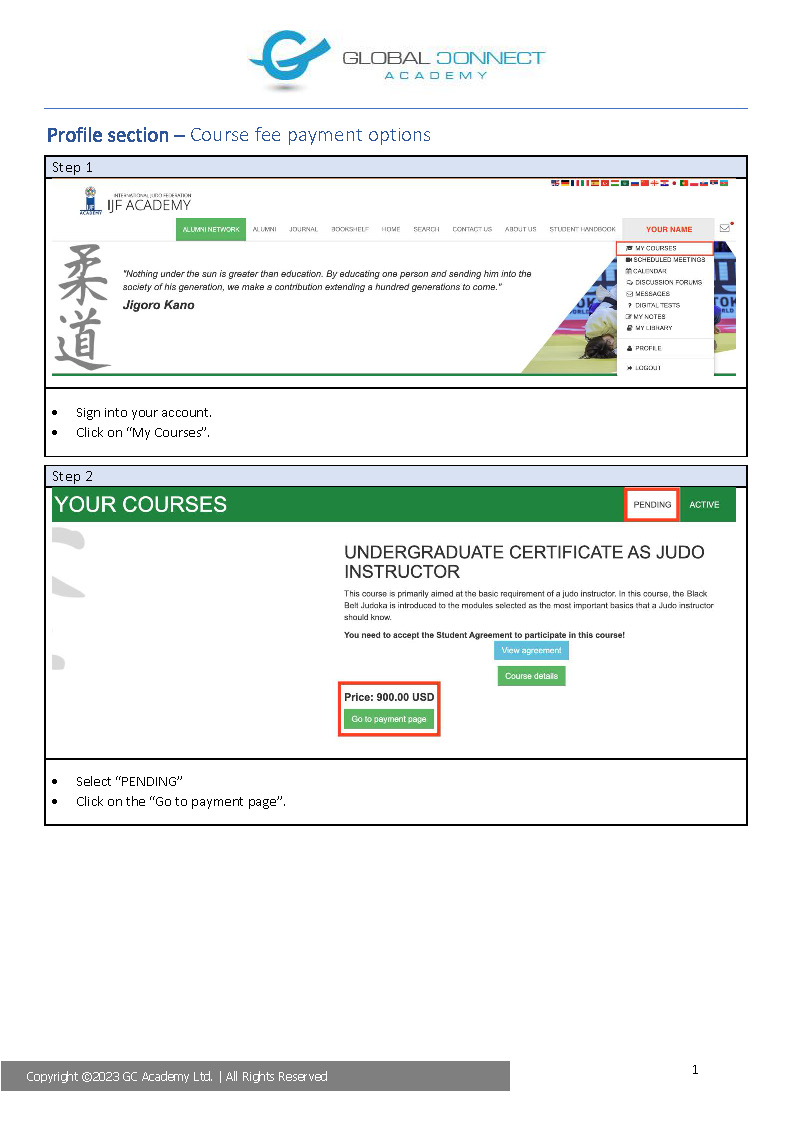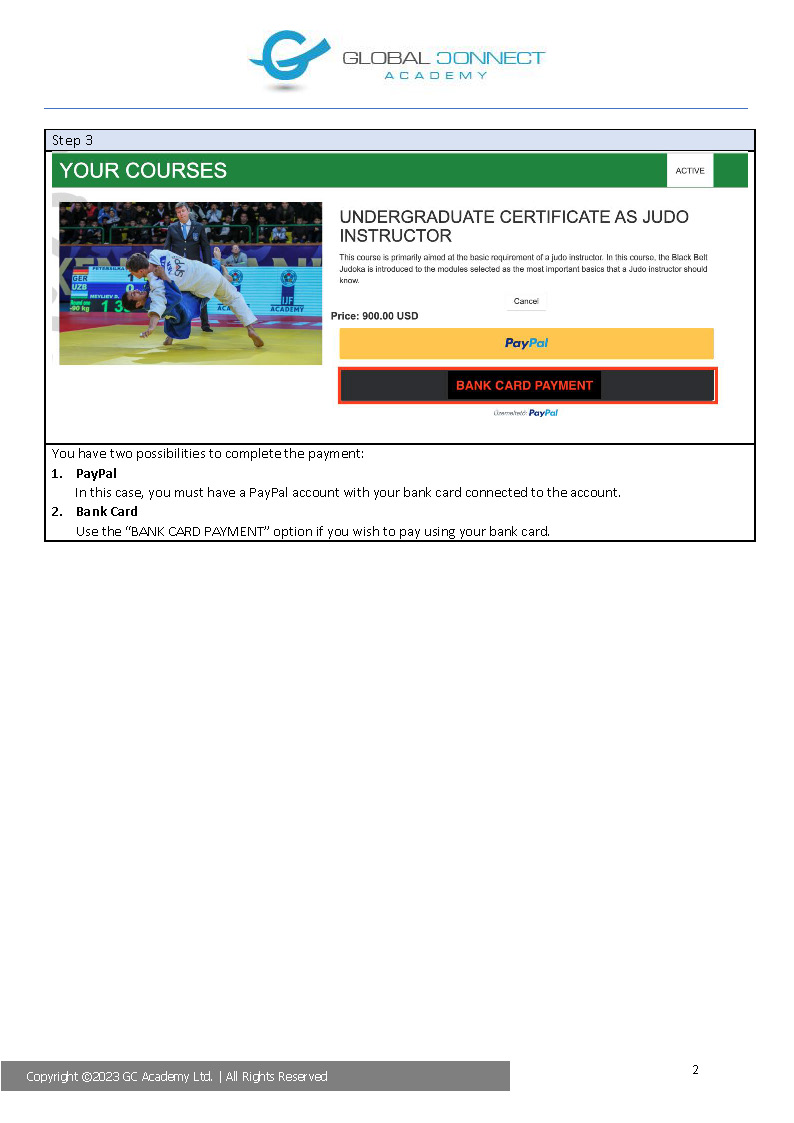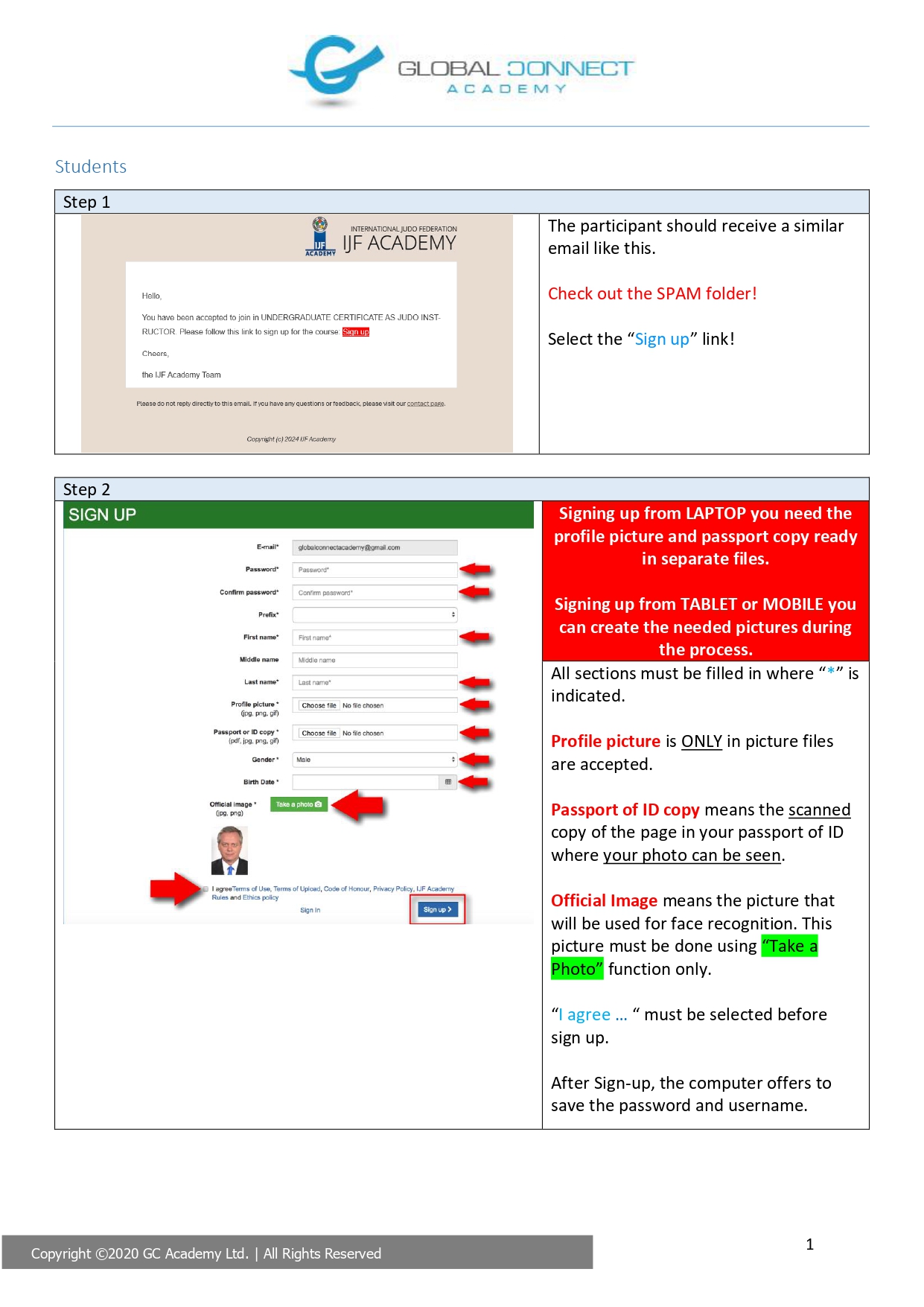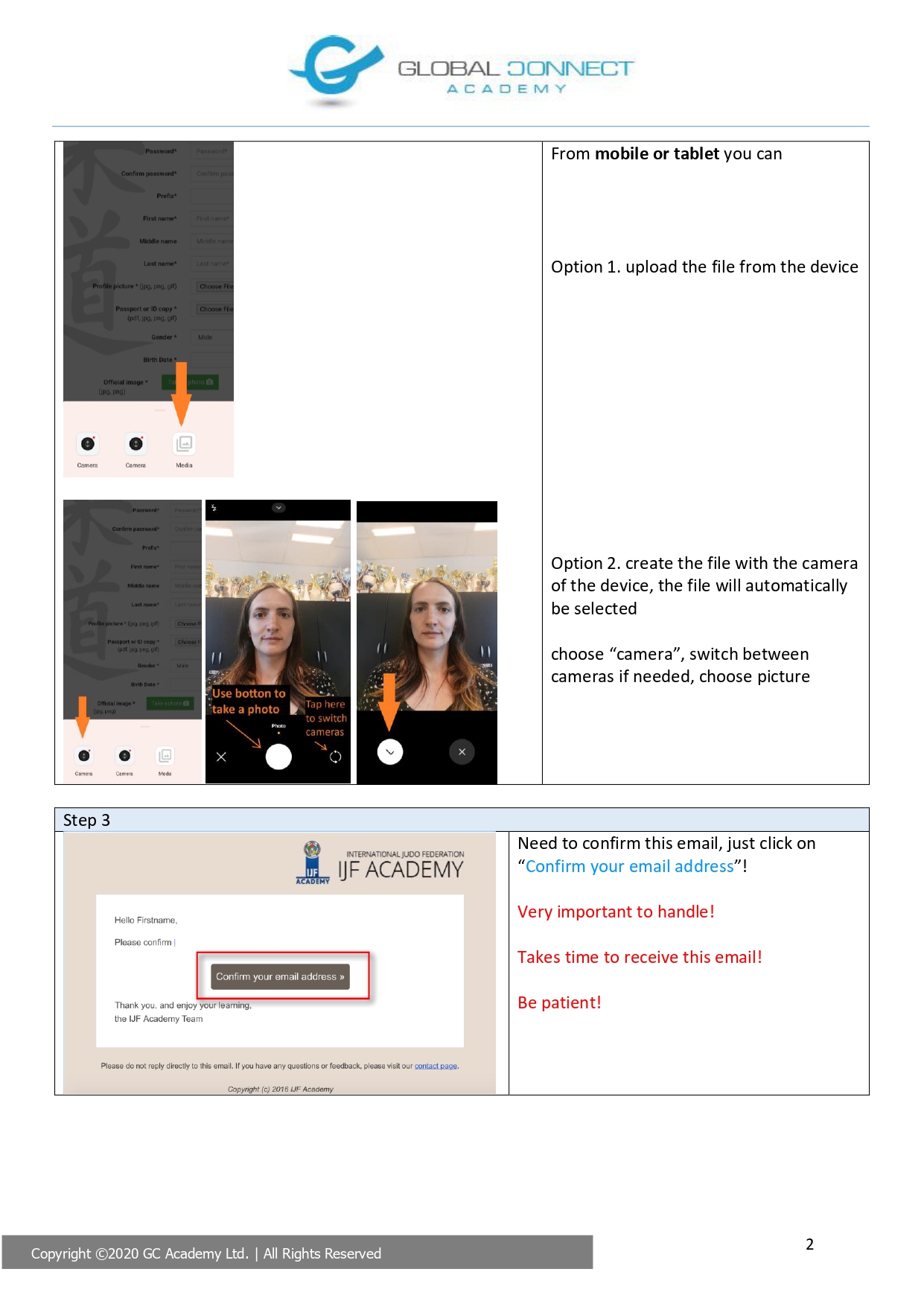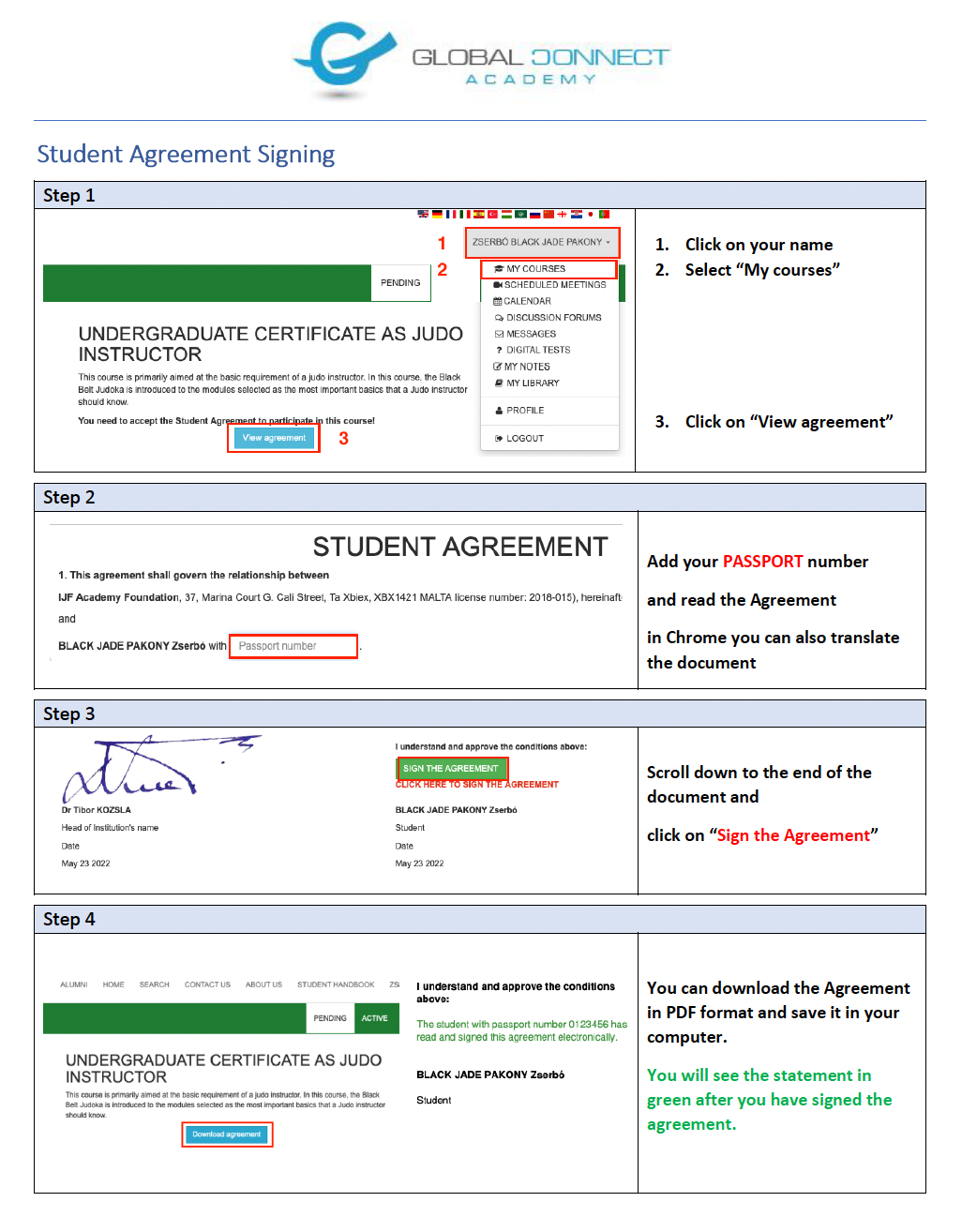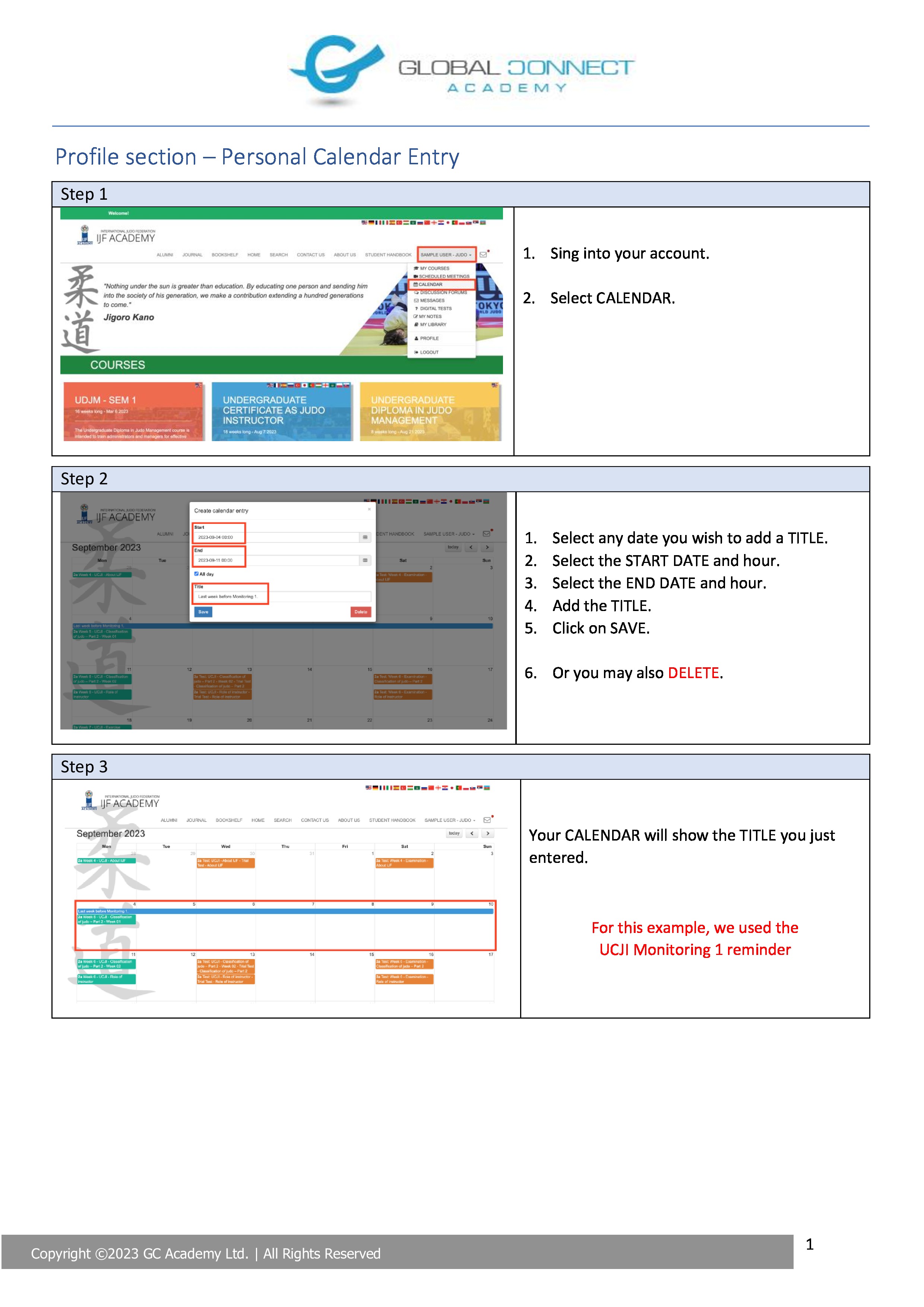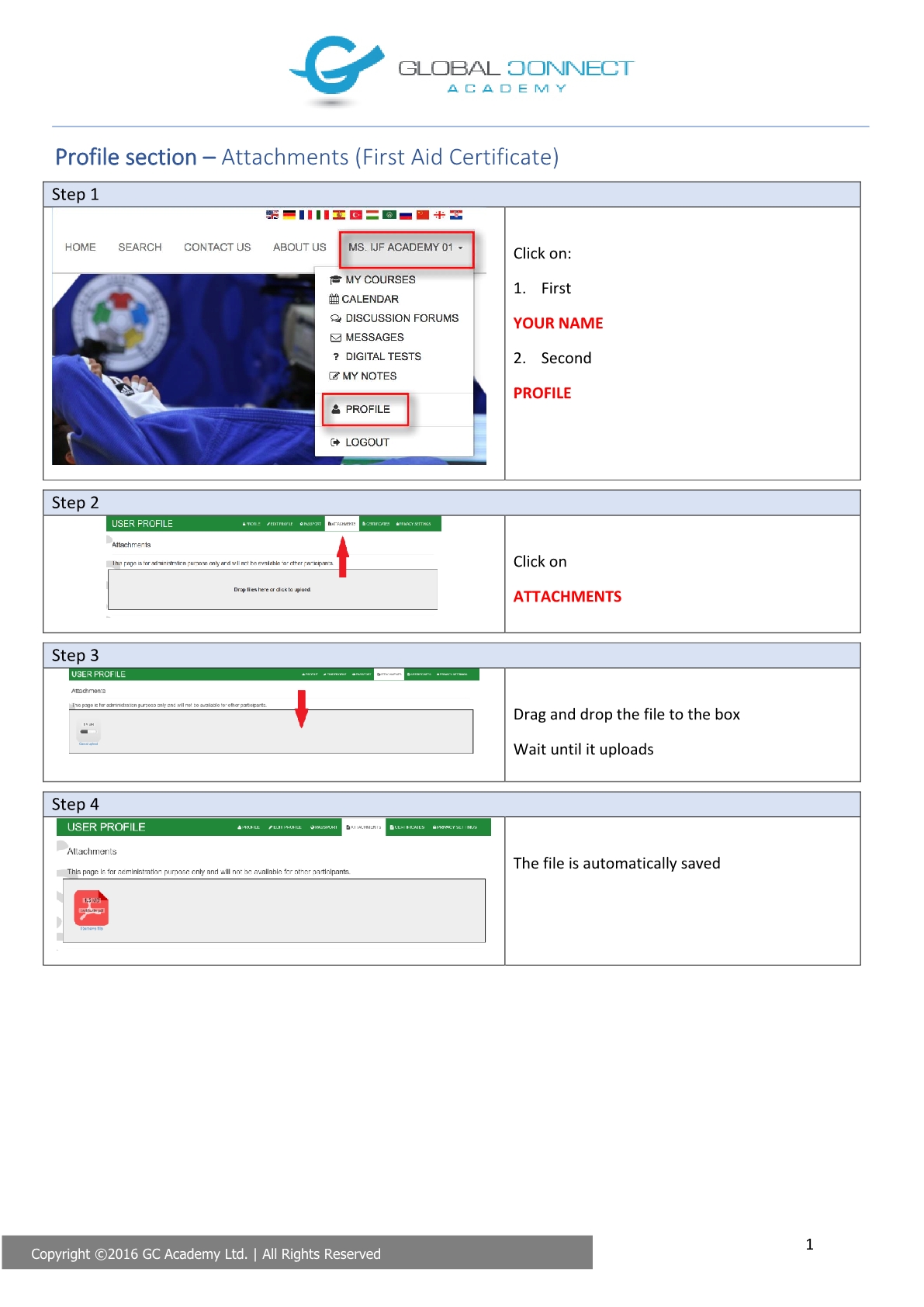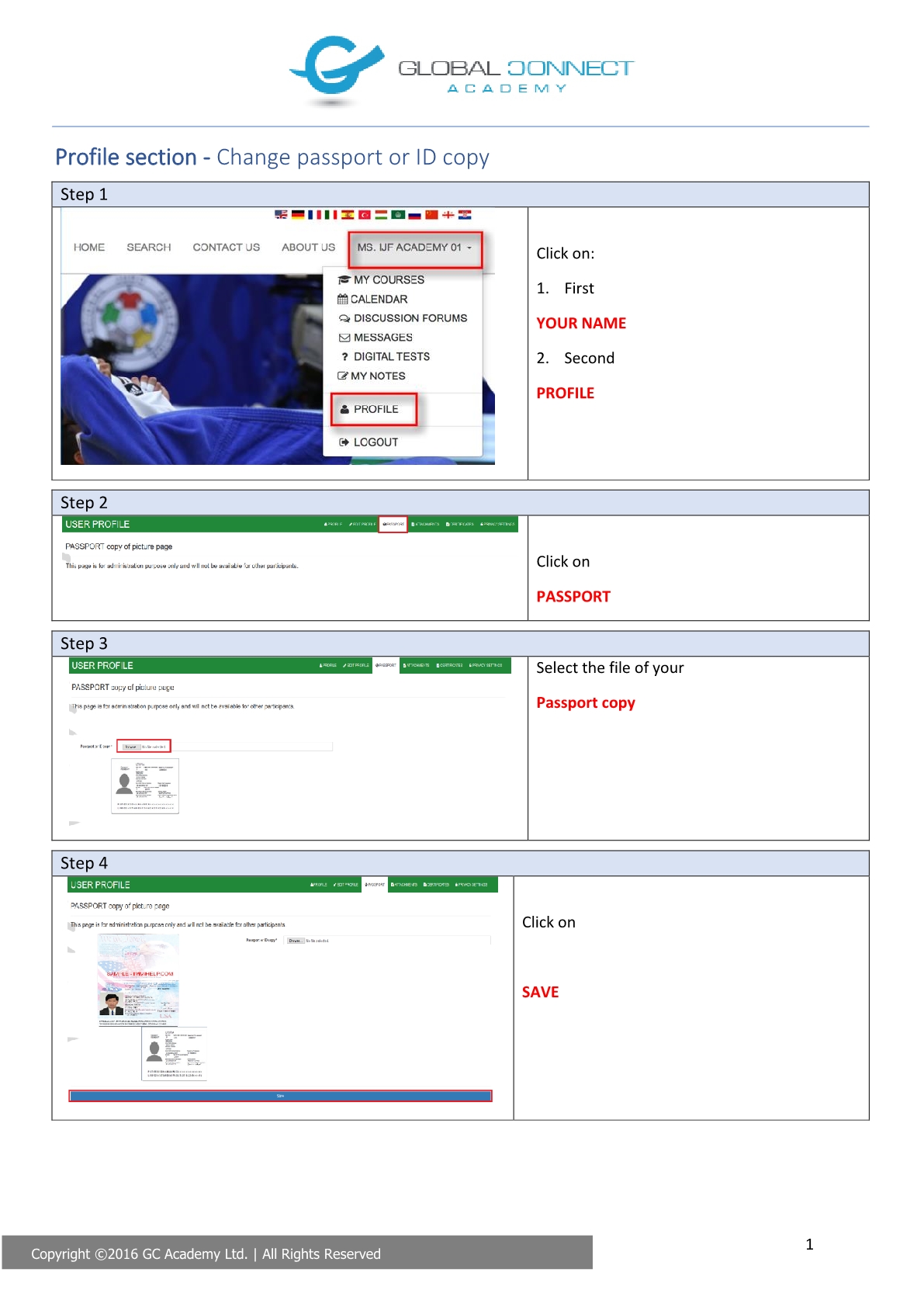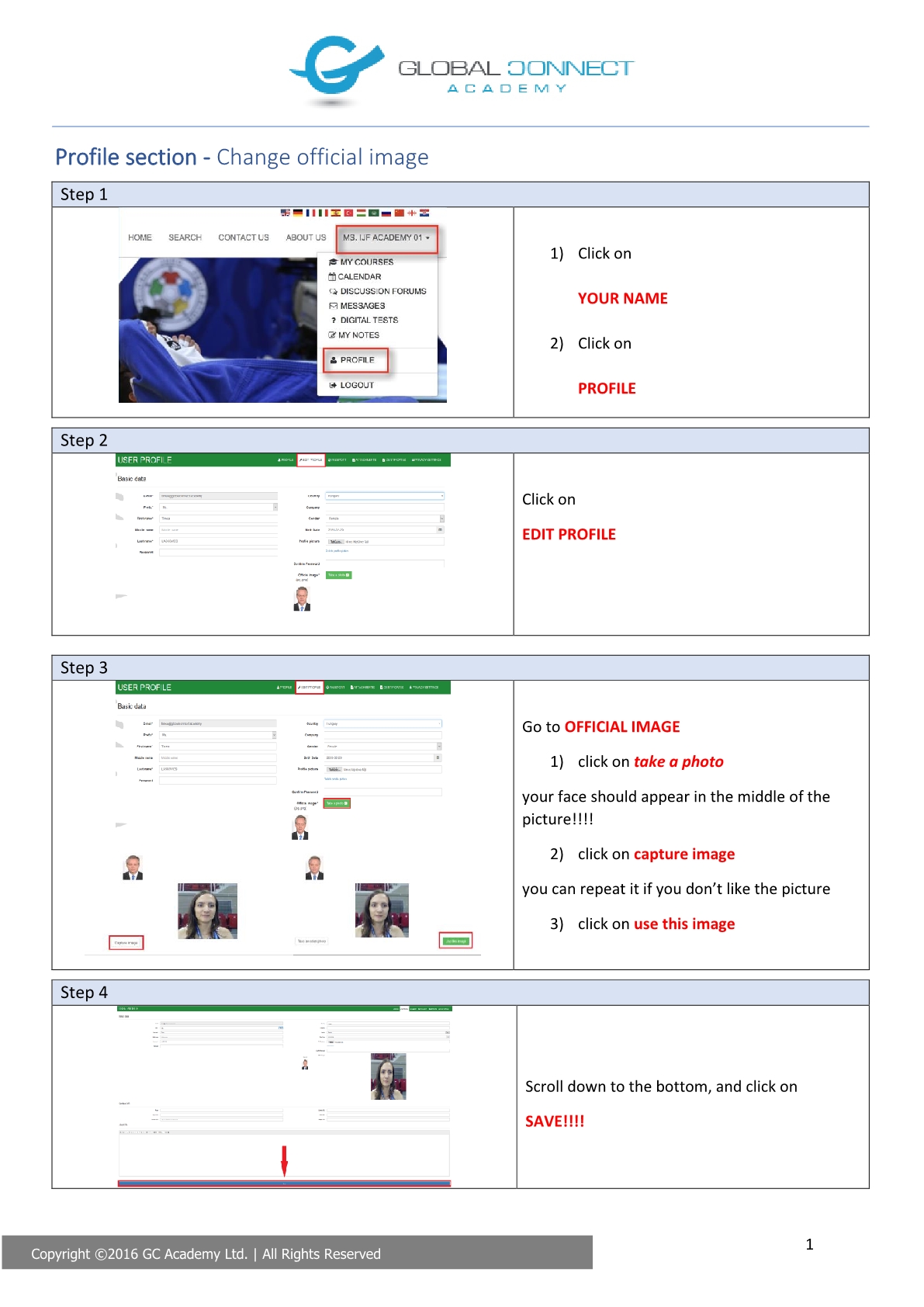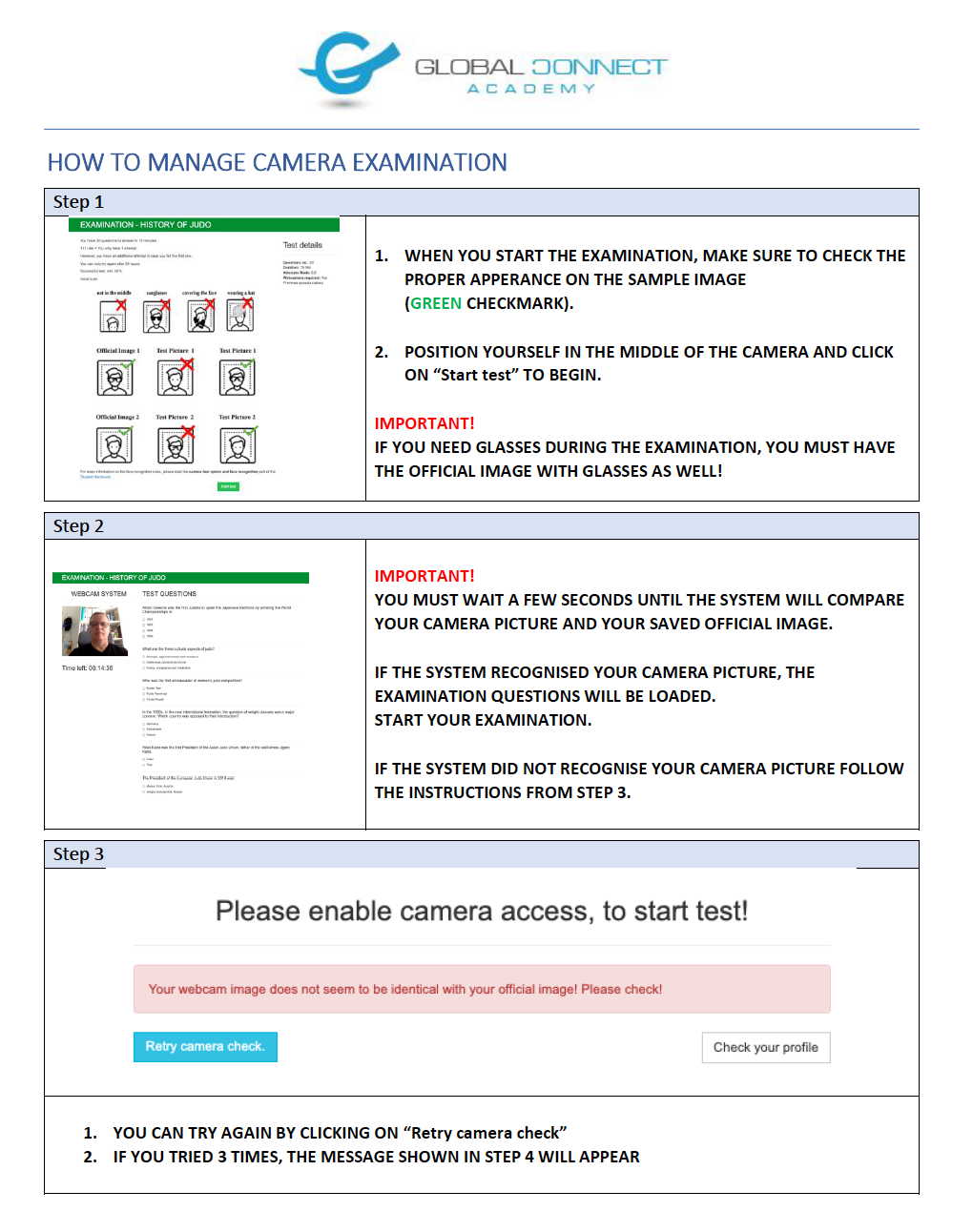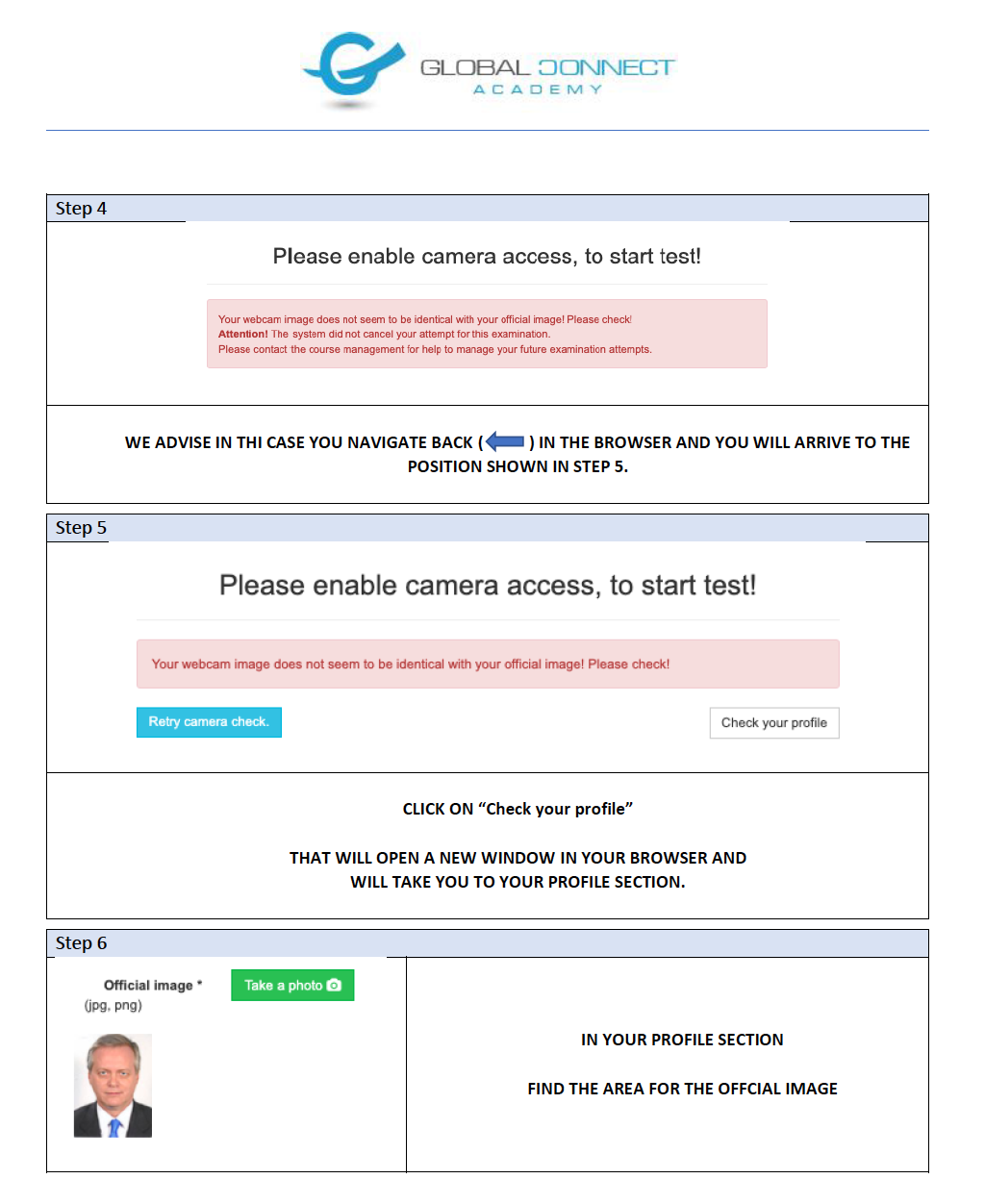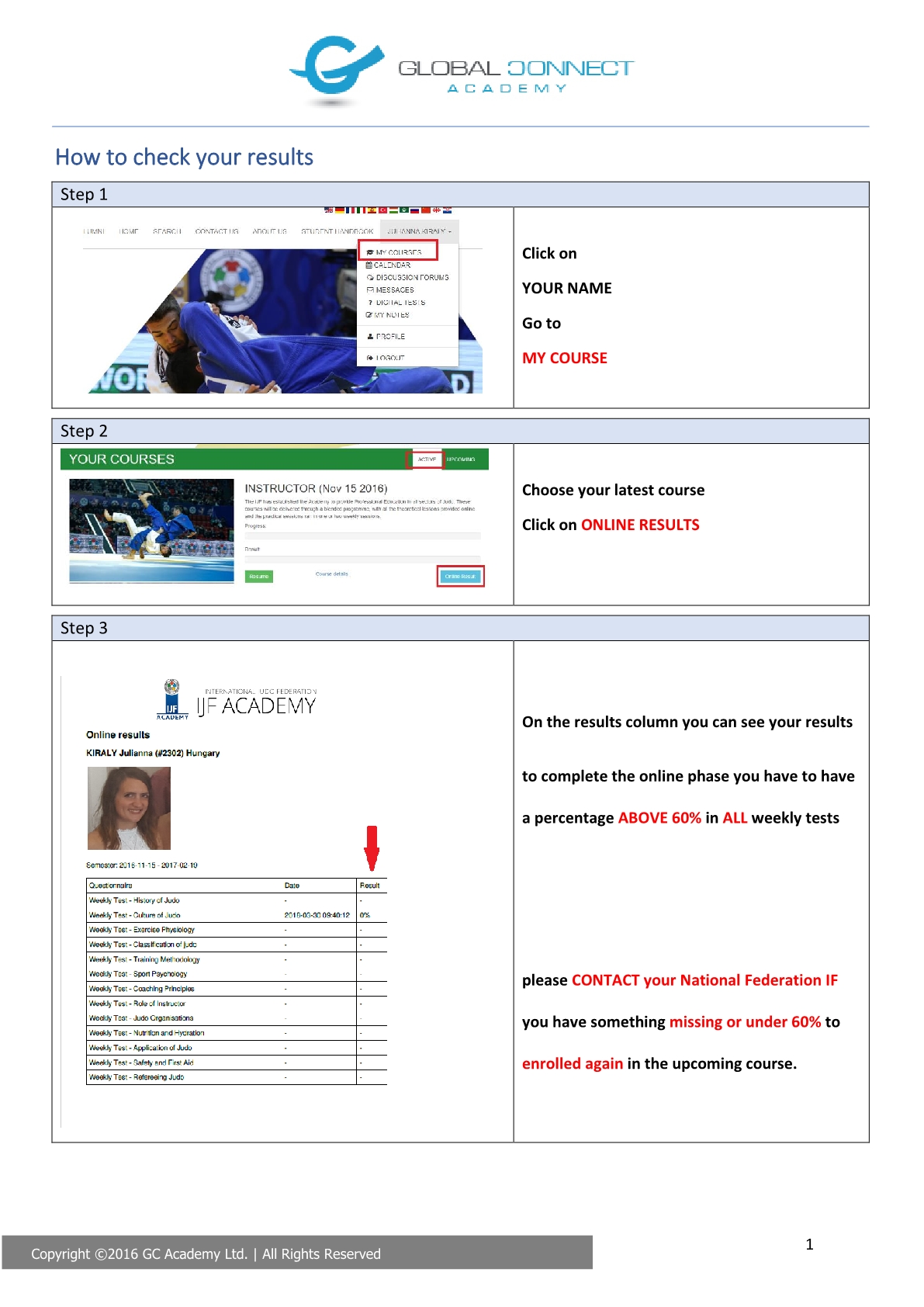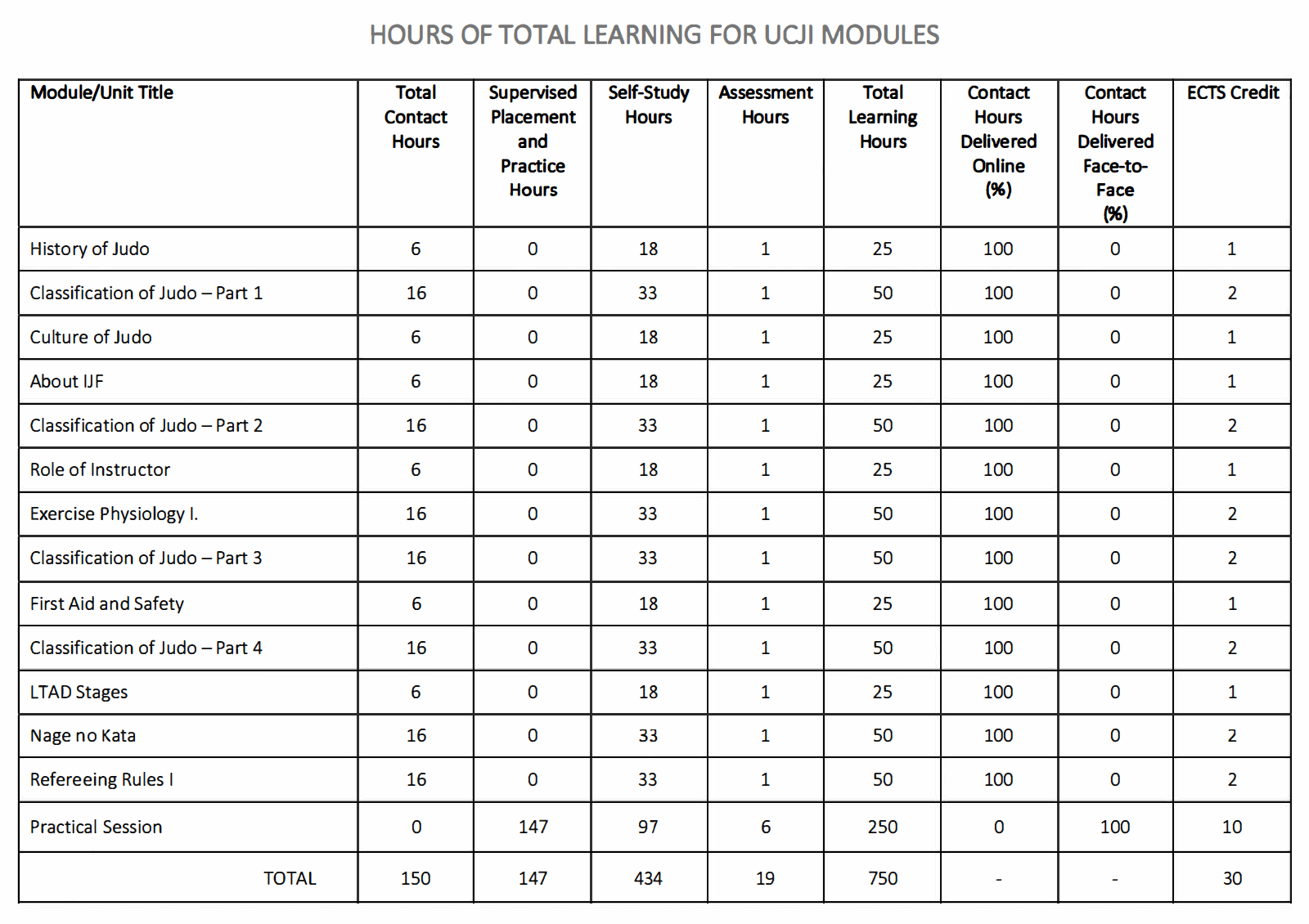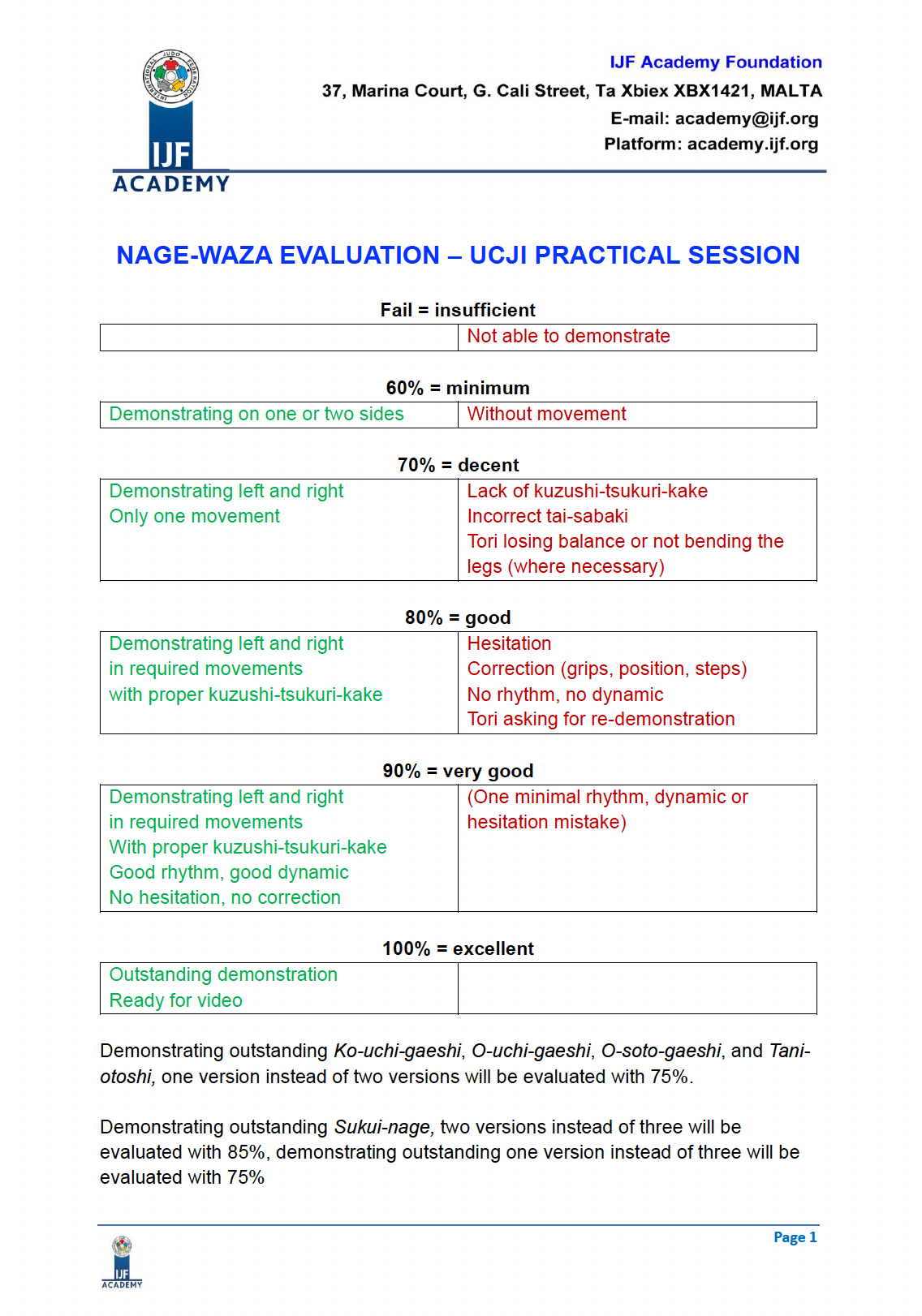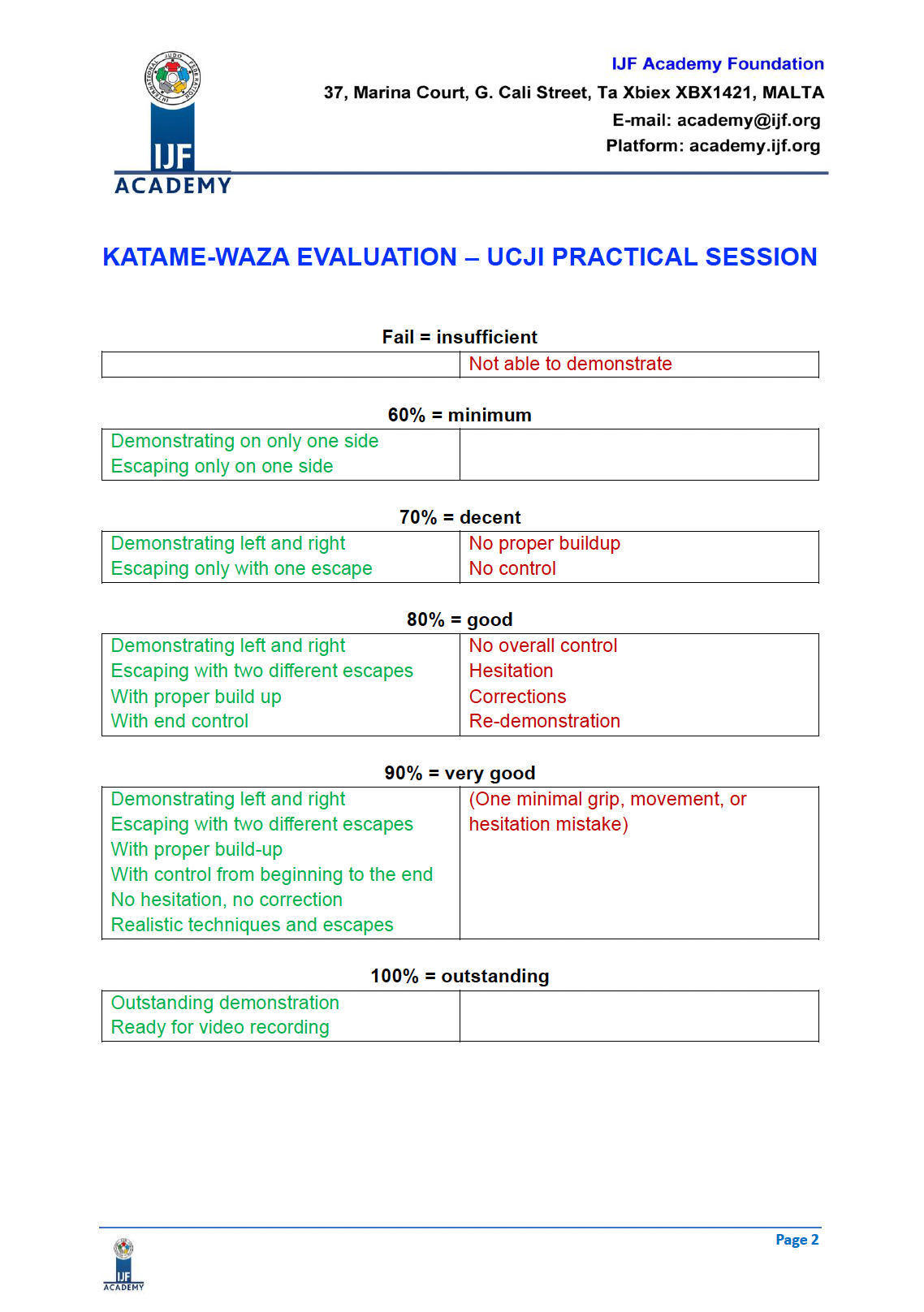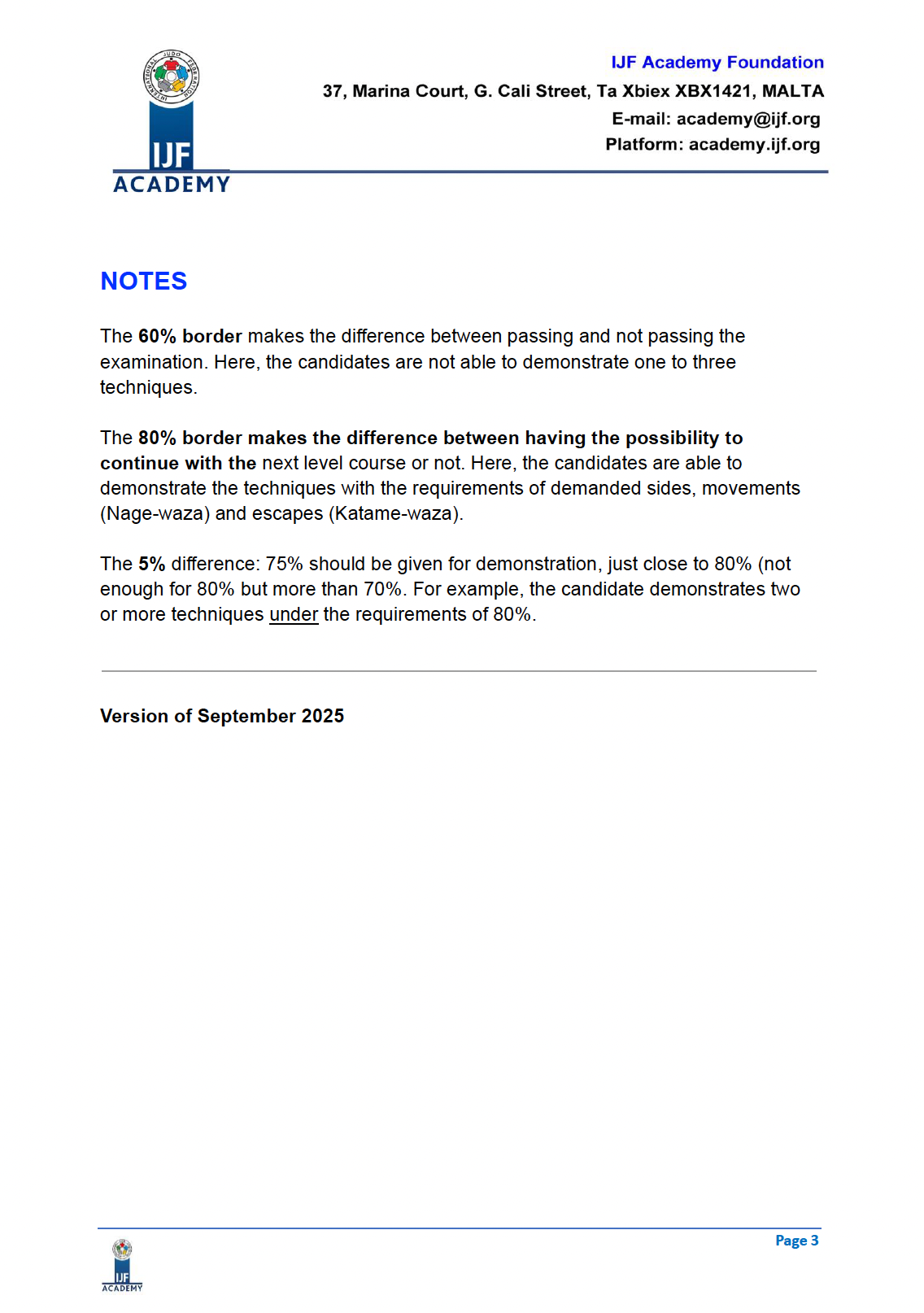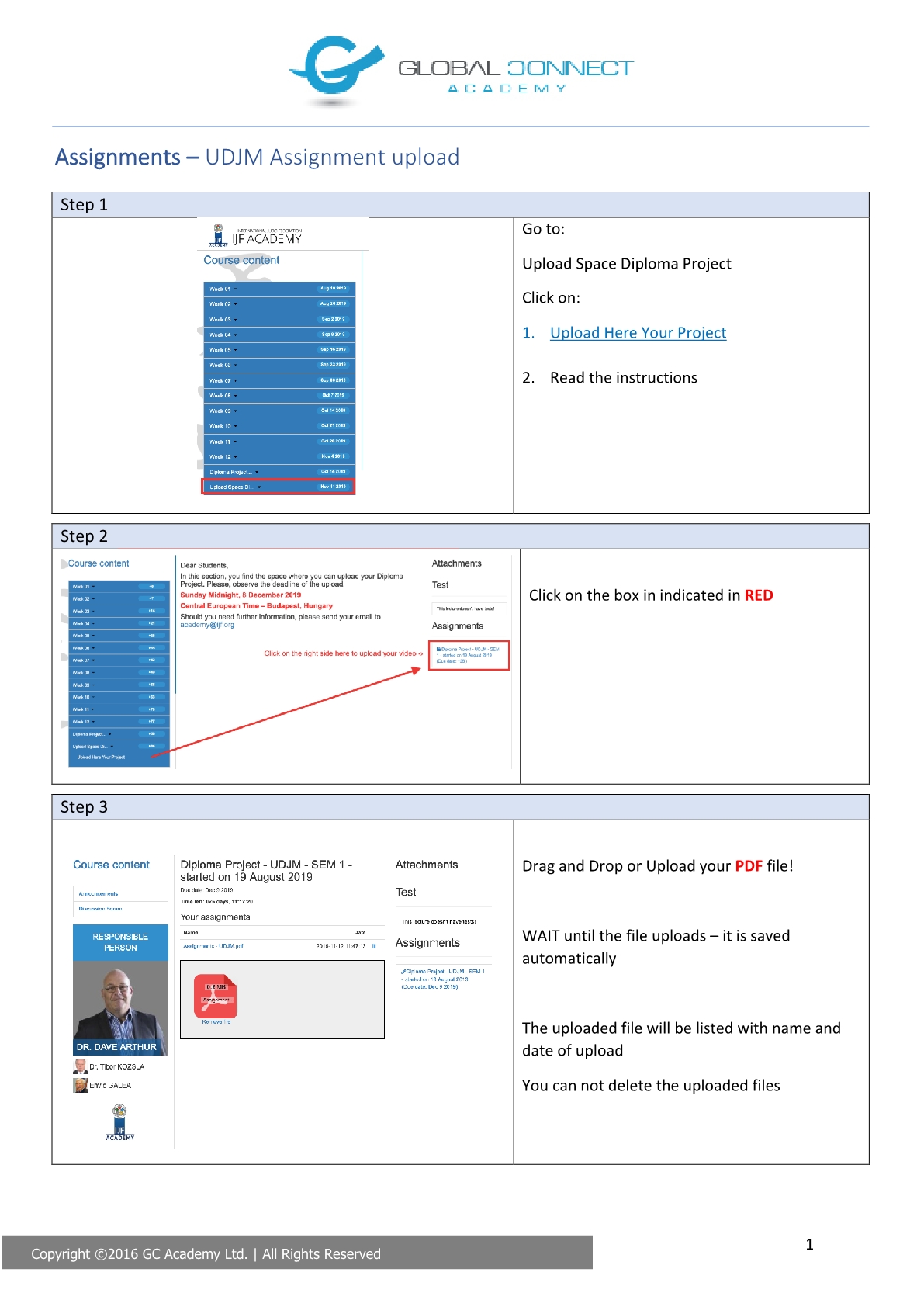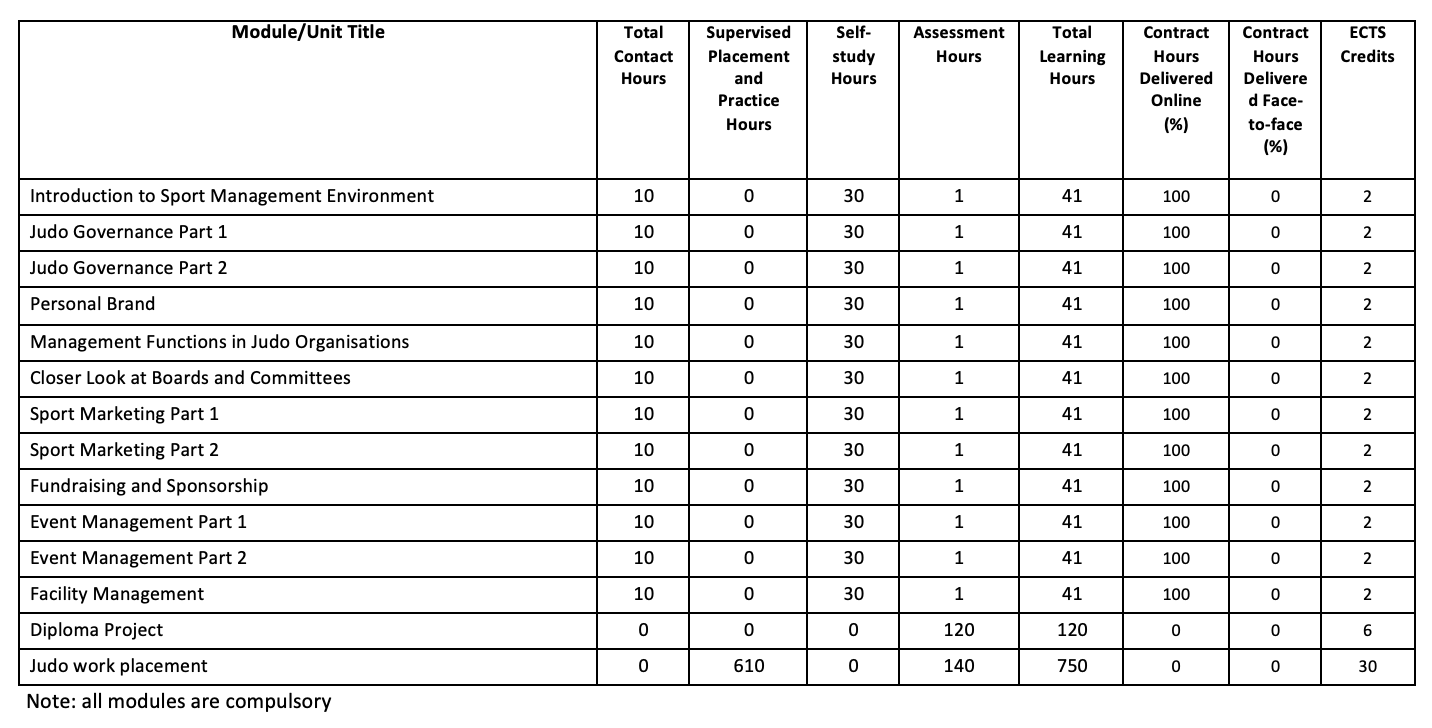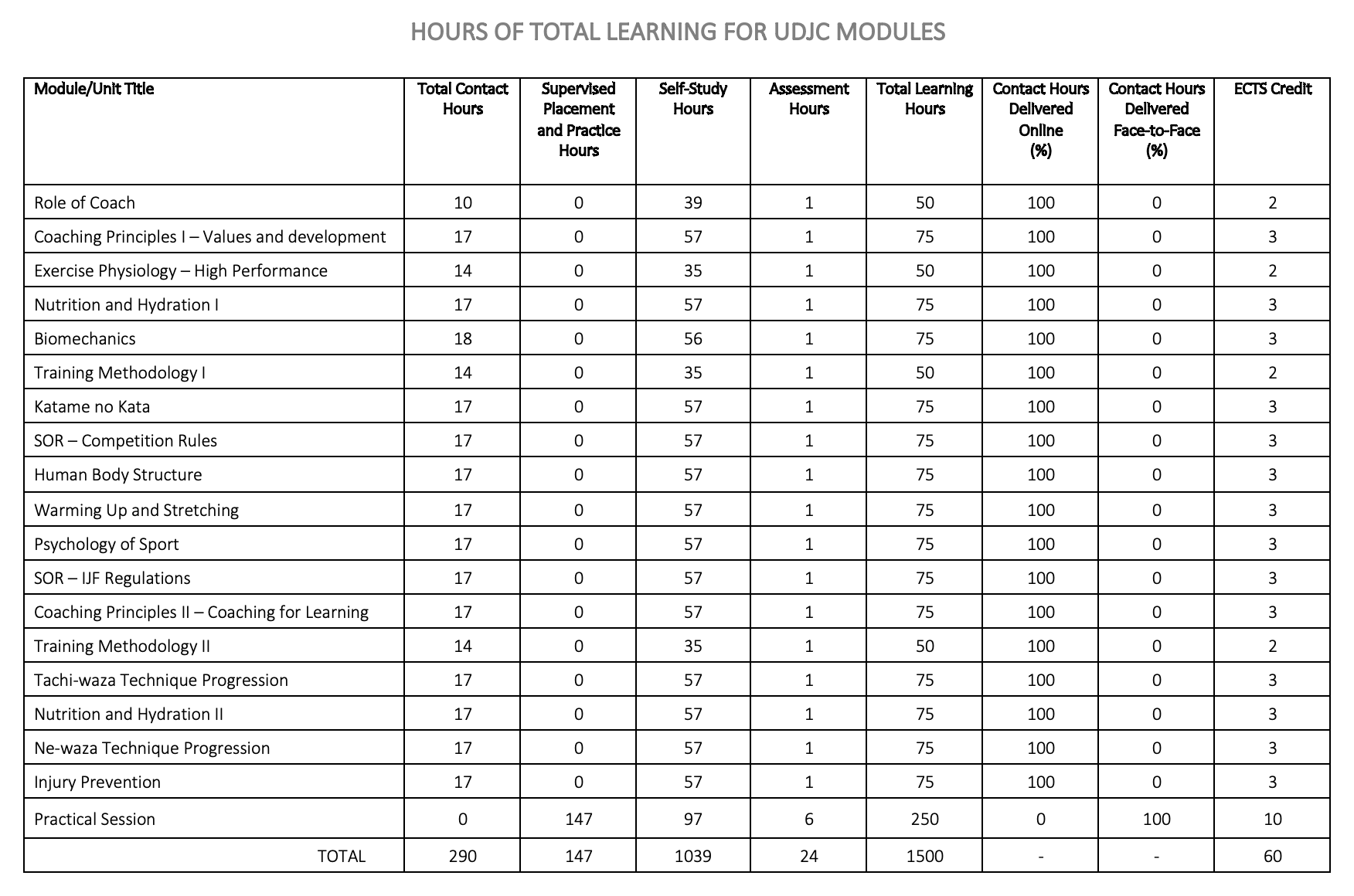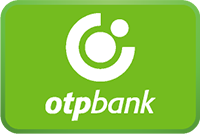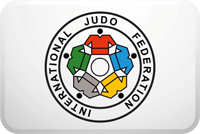Some courses do require to activate the web camera of the used devices. The system works on iOS and Android mobile phones and tablets as well.
When a Video Test option is active, the students have to allow their laptop, desktop, mobile phone and tablet computers to access the camera.
Students have to pay attention during the camera tests for the following cases to avoid test cancellations:
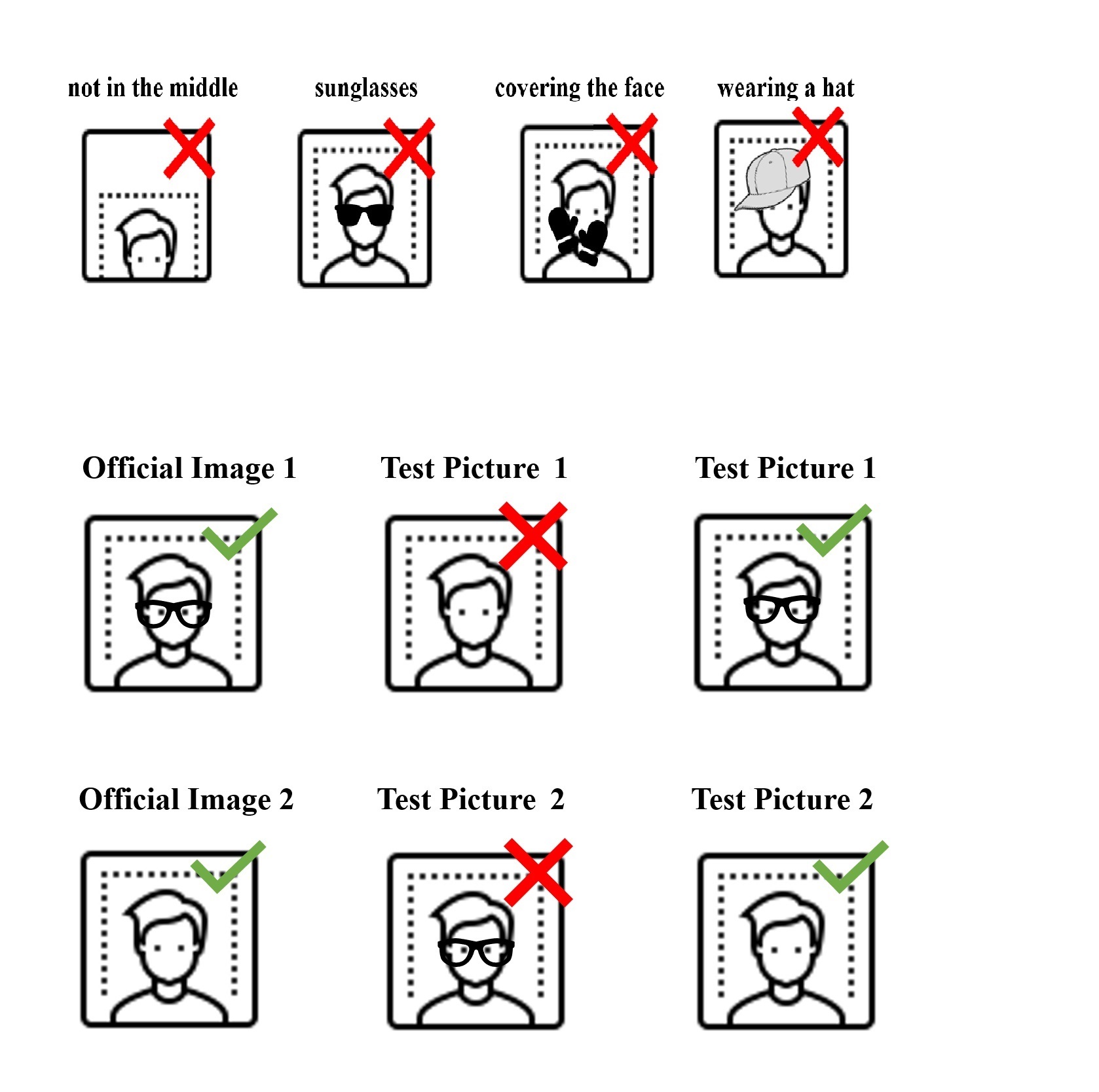
Further to the above examples, the following test will also be cancelled if the student:
- is lying on the bed,
- is wearing the head or earphones,
- is captured from the side and not from the font; both ears must be visible (like in passport),
- is not dressed properly (minimum a T-shirt is required)
- is not alone in the picture.
Please, visit the student handbook periodically, as the IJF Academy management applies amendments and changes when it serves the better understanding and benefit of the students.
The language of daily communication with IJF Academy management and staff is ENGLISH. Please, use the google translate service to manage the communication in your language.
The IJF Academy does NOT communicate with students via external social media, such as Viber, Messenger, Telegram, What's Up, etc. Students must send emails using the Contact Us facility on the platform. Such communication must include the following elements: (1) name of the students, (2) country of the students, (3) programme of the students and the (4) request or question. Such a format is required. For emails that do not include the mentioned information, the IJF Academy will not be able to process them.
You can change the settings of your CHROME browser to translate the platform into your language if it is available.
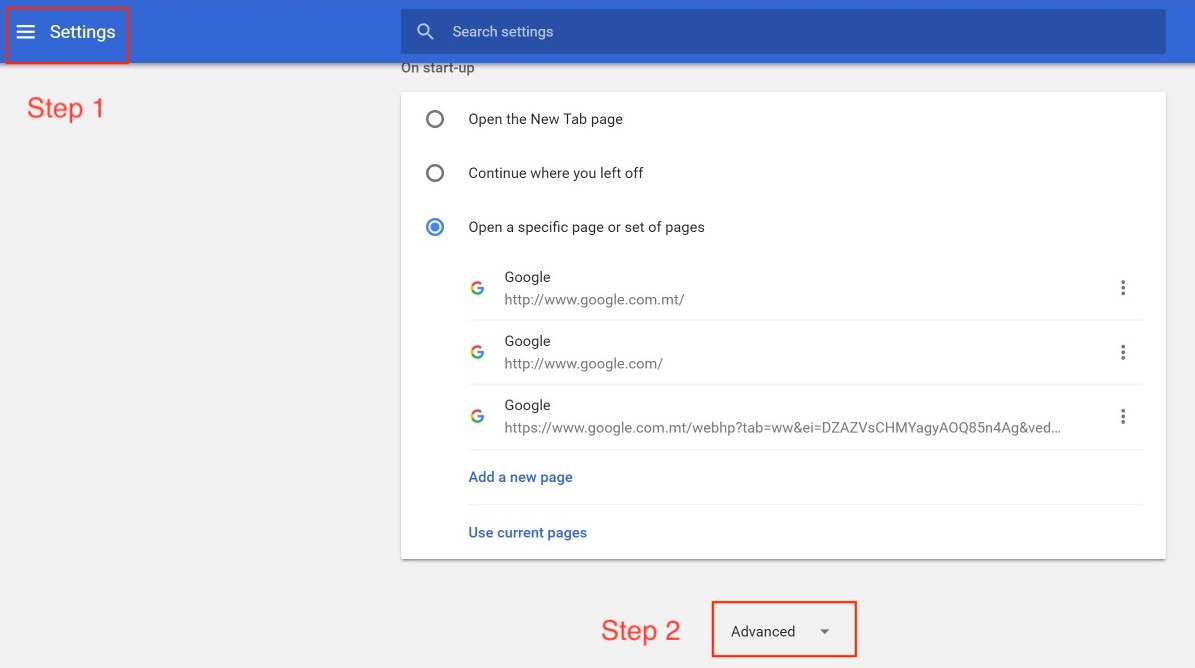
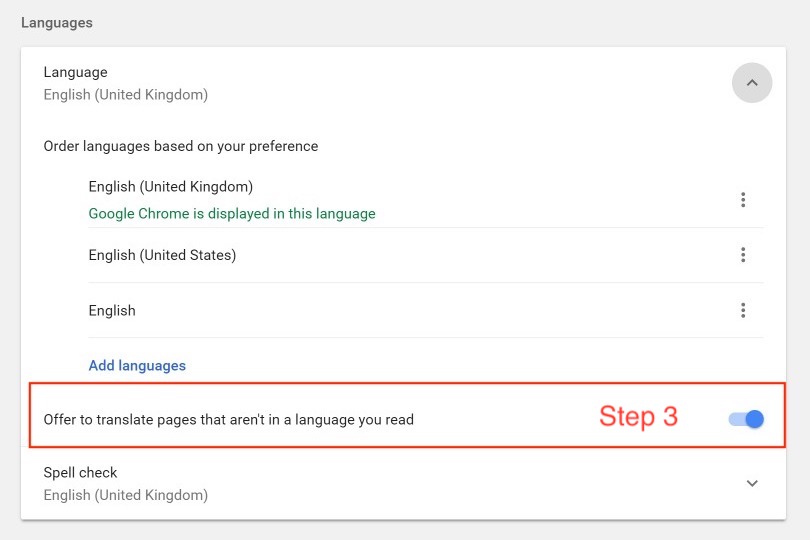
The platform is designed for desktop computers, laptops, tablets, and mobile phones to review the content. It is highly recommended that the students use desktop and laptop devices for completing the camera Weekly Examinations.
Users must use the one of the following browsers:
- Windows operation system computer, Windows 10, 8, 8.1 operation system tablet
- Microsoft Edge
- Internet Explorer 9+
- Mozilla Firefox 3.5+
- Google Chrome 3.0+
- Opera 10.50+, 15.0+
- OS X operation system computer
- Safari 3.1+
- Windows Phone operation system
- Internet Explorer 9+
- Android operation system phone better than 4.0
- IOS operation system tablet and mobile phone
- Safari 3.1
- Windows RT operation system
- Internet Explorer 10+
Every lecture includes learning material for download. The students can download the suggested content that can be used offline. The list of downloadable content is available on every module page of the Platform.
Click here, and enter your e-mail address. You will receive an e-mail to this address to help you retrieve your password.
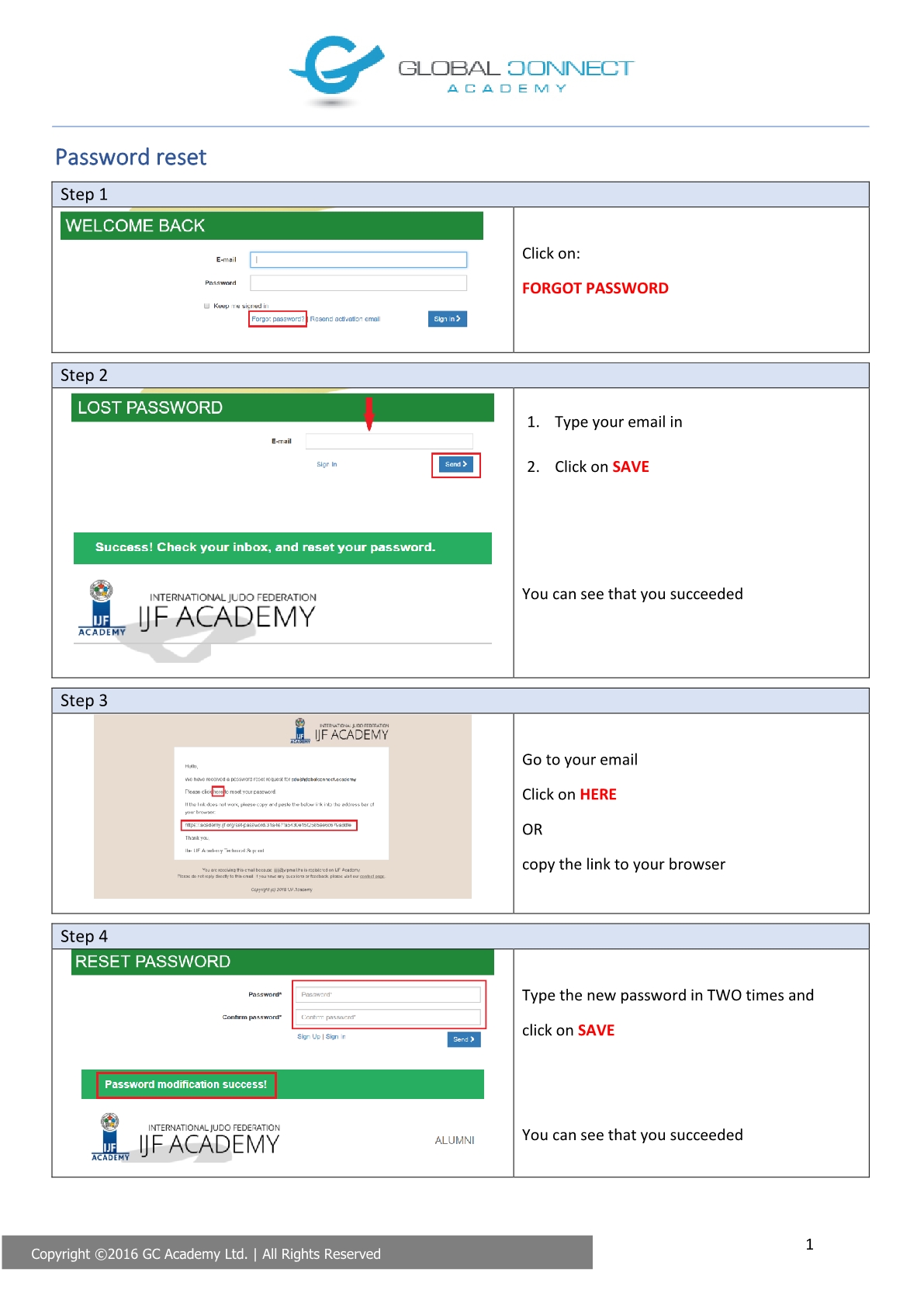
The selection and nomination of potential students is the sole responsibility of the National Judo Federations affiliated with IJF. The National Judo Federation has the authority to retract any nomination they find necessary. Any nomination and cancellation must be communicated with the IJF Academy in writing.
The nominated students must have a personal email address that will be used as access to the platform during their study period. NO email address of National Federations is accepted; it is highly recommended to set up a GMAIL address for this programme (https://accounts.google.com/signup).
The IJF Academy will send an electronic invitation using the personal email address of the students to sign up. Using the email address and the selected password, students sign in to the platform and start the programme.
Follow the guide hereunder that helps with the sign-up procedure.
DO NOT USE YOUR MOBILE PHONE FOR SIGN-UP! USE (A LAPTOP) COMPUTER TO COMPLETE THE PROCEDURE.
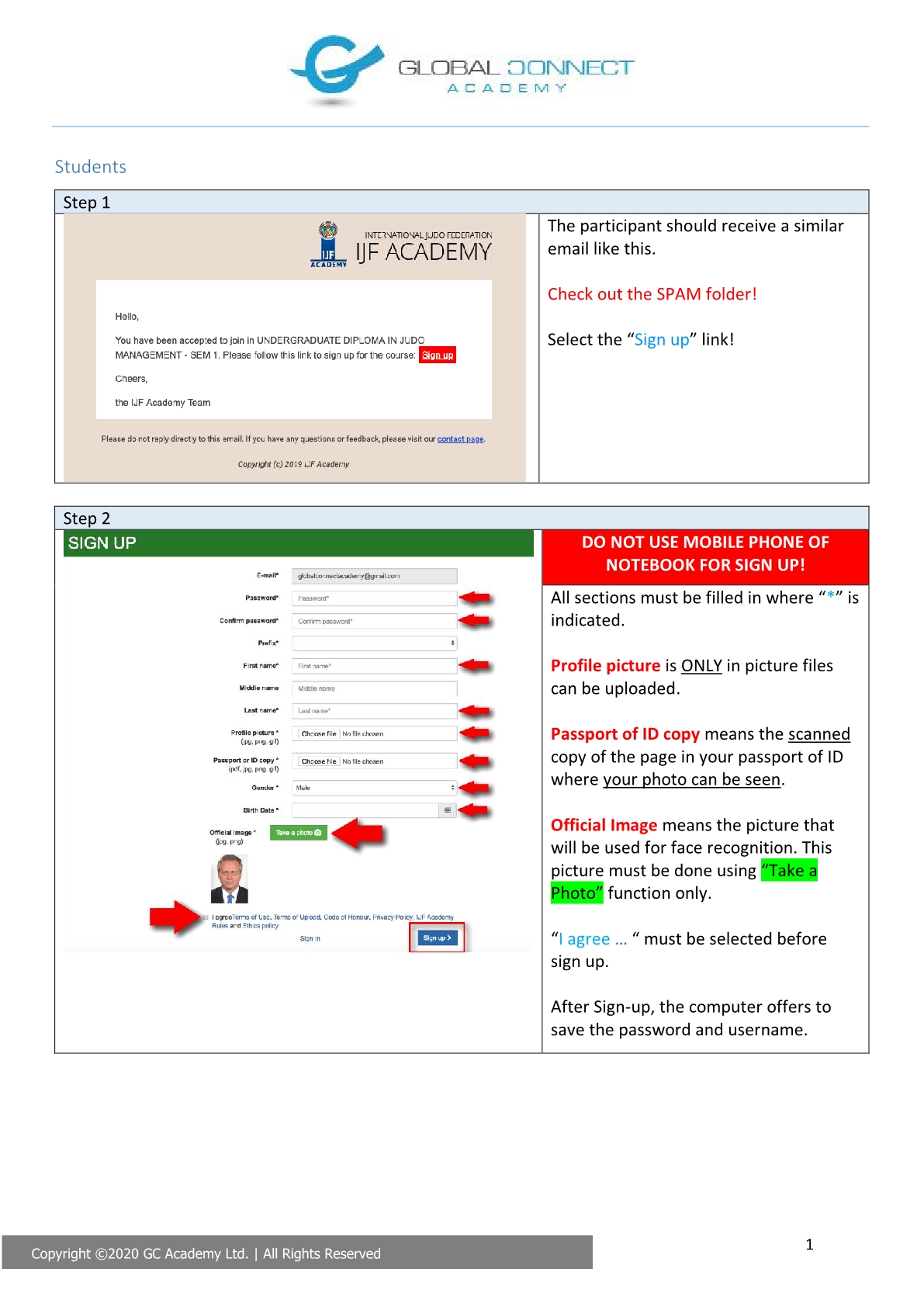
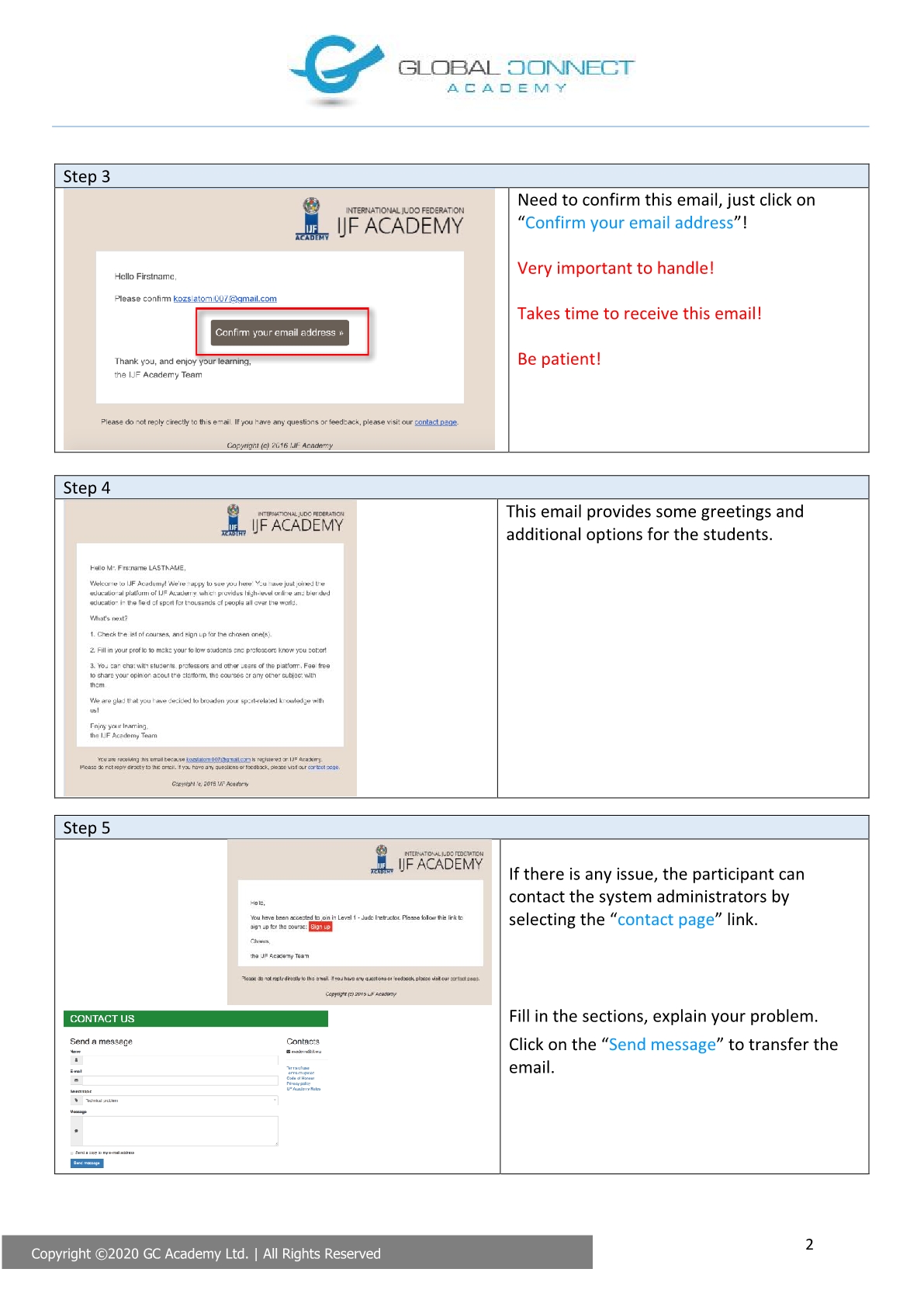
Registered students must click on the "Sign in" button in the top right corner of the Platform. Type in your username, the email address used by “Sign-up”, and the password, then click on "Sign in".
The programmes of IJF Academy are accredited by the Malta Further and Higher Education Authority.
The students of IJF Academy Programmes have the opportunity to monitor their study progress at any the time. The Platform includes the feature “Online Result” in the profile “My Courses” section of every student. This feature can be accessed only after the student has signed in.
The “Online Result” feature generates a PDF document that shows the achieved result/grades of the student. The generated information provides the period of the semester, title, date and the result of the subject. In this PDF document, the Platform provides the best result that the student has achieved during the 3 attempts of the Weekly Test.
The students can also monitor the results of the Weekly Examinations and the Trial Tests. This information is available in the “Test Details” feature of every test, both Trial Tests and Examinations.
If the student has any doubt or missing information, the IJF Academy Management can provide the explanation requested by the student. Such request must be sent to academy@ijf.org
Every IJF Academy Programme has one or more assigned instructors/tutors. The name and the picture of the instructors/tutors are available on the Programme side. The students can also receive information about the instructor/tutor by reviewing the profile.
The IJF Academy platform provides different communication features between the students and the instructor/tutor.
The Forum Post allows every student to submit questions or queries related to each module/subject. The Forum Post feature provides the discussion for all the students enrolled in the same programme simultaneously. The instructor/tutor provide guidance and explanation for the students answering the questions or query submitted by a student. The translation device of the Forum Post provides flexibility for the students to submit their questions in their language.
The students also can contact the instructor/tutor directly. The Chat feature serves this possibility.
Students can also send a personal email message to the instructor/tutor directly. The email address of the instructor/tutor is available on the programme site of the platform.
The subject of the Forum Post and the direct email messages can cover questions and queries, including but not limited to issues of guidance in study skills, finding resources and counselling.
Meeting between a student and the instructor/tutor can be scheduled individually. Since the students of IJF Academy come from all over the world and live in different time zones, such a meeting must be scheduled carefully.
The students of the IJF Academy Programme can provide their feedback after the Programme is completed.
Every IJF Academy Programme has a specific online questionnaire where the students can express their opinion online anonymously. The feedback form is sent by email and includes the deadline for completion.
The students receive an invitation for the questionnaire by email, where they can use the link that connects to the online form. The questionnaire has mandatory and free questions. Every section of the questionnaire allows students to express their notes and proposals.
The completed feedback forms are evaluated by the IJF Academy Management and stored in the database. The highlighted short summary of the results is presented in a PowerPoint format and circulated among the instructors/tutors of the programme for review. The IJF Academy Management highlights the results that require attention from the instructors/tutors. The IJF Academy Management hold a meeting the discussion the results and find the solution if necessary.
The IJF Academy students can submit their complaints and/or appeal against any decision taken by the IJF Academy Management, including the results of tests, assignments, and practical scores. Any appeal shall be submitted to the platform using the “Contact us” link on the main page. The students shall select "Complain" or “Appeal” in the “Select topic” drop-down menu. A detailed description shall be posted and sent to the IJF Academy Management. This email will automatically be sent to the info@ijf.edu.mt email address.
The submitted appeal message will be handled by the Head of Institution of IJF Academy. The proposal of solution regarding the submitted appeal of the students is circulated among the instructor/tutor and the IJF Academy Head of Institution for final approval of the decision.
The IJF Academic Head of Institution will send the final decision of the submitted appeal and handles the appropriate administration, if necessary, in the database of the student who submitted the appeal.
The IJF Academy Programmes are designed so that students can study using the online platform anywhere and anytime. If students face scheduling difficulty in completing the programme within the timeframe of the given semester, they can request the completion of the missing Weekly Examination during the upcoming semester.
Every student must finish the IJF Academy programme(s) within 24 months from the date of their sign-up/registration. After 24 months, the programme results will expire, and the student has to start all over again from the beginning of the programme.
Students must send a letter to academy@ijf.org to submit such intention.
Students must send a letter to academy@ijf.org if they intend to terminate the programme.
Cancellation and Refund Procedures
A student may exercise the right to be refunded the tuition fees when:
(i) When the student withdraws from the programme before the agreed starting day.
(ii) The withdrawal must be communicated in writing via email sent to academy@ijf.org email address.
The students can find a copy of the certificate(s) in the “Profile Section/Certificates”, which they can download anytime.
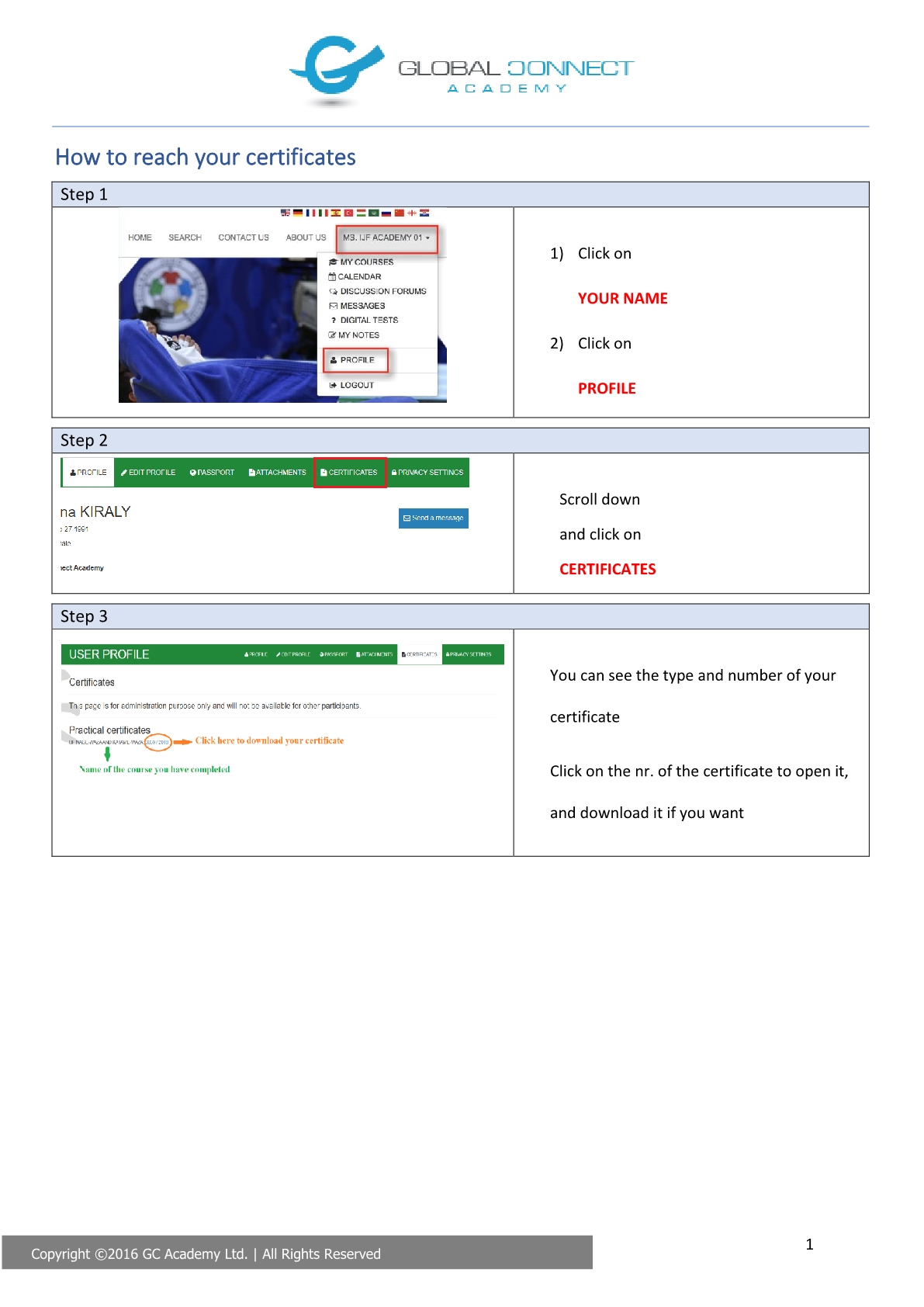
The UCJI course starts two times per year.
Semester 1 of the year begins in March (the first Monday of the month)
Semester 2 of the year begins in August (the first Monday of the month)
The IJF Academy Management reserves the right to cancel any semester start indicated above if the minimum number of students exceeds 50.
- The Undergraduate Certificate as Judo Instructor (UCJI) programme is a Higher Education Programme accredited by the Malta Further and Higher Education Authority.
- The programme has 30 ECTS credits at Malta Qualification Framework (MQF) Level 5.
- The programme is part-time and aimed at the ages of 18 and 65+.
- Students may require VISA during a practical session organised in Malta; this link provides more information.
The International Judo Federation (IJF) has established the Academy to provide professional education in all sectors of judo. Its first focus is on the technical sector.
The UCJI programme is intended to train instructors for effective work with youth and beginner athletes, mainly at a national level. The instructor’s responsibility is to teach their students the techniques of judo. The UCJI syllabus encompasses theoretical subjects and the practical skills of coaching. At the same time, the UCJI programme provides a theoretical base to allow instructors to continue learning, both through their own efforts and within the structure of the IJF Academy.
The Undergraduate Certificate in Judo Instructor programme is intended primarily as an entry-level course for the International IJF Coach licence.
From January 2023, all coaches are required to have the minimum qualification of UCJI to participate in international judo events organised by the IJF. All coaches representing all 205 National Judo Federations affiliated with IJF need this level of certification.
If the National Federation coaches are not involved in teaching high-performance competition, this programme will give them the structure and methodology to teach judo to all sectors of judo. The academic qualification also allows our UCJI graduates to seek jobs as judo coaches in education institutions.
Therefore, all judo coaches, who need an international licence, and retired competitors who want to work as coaches are all potential students of this programme.
The IJF Academy advertise this programme as a form of a dual-career opportunity for junior judoka who want to receive an academic qualification while they are still competing, as our blended form of delivery is ideal for them.
- Minimum 18 years of age.
- Black belt, first Dan in judo with valid membership of a National Judo Federation affiliated with IJF.
- Access to the internet by utilising the dedicated online portal to undertake the dedicated module online examination as well as access a range of indicated online resources.
- Knowledge of the official programme languages.
- Necessary fitness level to complete the practical session.
The selection of potential students is the sole responsibility of the National Federations affiliated with IJF.
The nominated students must have a personal email address that will be used to access the education platform during their study period.
No email address of National Federations is accepted; it is highly recommended to set up a GMAIL address for this programme (https://accounts.google.com/signup).
The IJF Academy will send an electronic invitation using the personal email address of the students to sign up. Once signed up, students can sign into the platform with their email address and password and start studying.
Follow the guide above that helps with the sign-up procedure.
Phase 1 (online session) of the programme is delivered through 18 weeks.
Phase 2 (practical session) of the programme is delivered in 1 week. The one-week practical session is organised in collaboration with National Federations and National Olympic Committees in different locations according to the needs.
The programme, in total, takes 19 weeks to complete.
Students must pay the corresponding programme fee (if any) according to the published payment schedule on the programme information page. No refunds are given after payment for admissions unless the candidate is not enrolled in the programme. More details are available in the student agreement that can be reviewed when enrolling in the programme.
Should the student not complete the UCJI online phase after two enrolments, the student must pay the course fee again when the student intends to enrol for the third and any additional time.
The programme is conducted in the following languages: Arabic, Azeri, Chinese, English, French, Georgian, Hungarian, Japanese, Polish, Portuguese, Russian, Serbian, Slovakian, Spanish and Turkish. The IJF Academy extends the number of languages according to the need expressed by the National Judo Federation.
Judo Instructor
This programme is primarily aimed at the basic requirement of a judo instructor. In this programme, the black belt judoka is introduced to the modules identified as the most important basics that a judo instructor should know.
The IJF has introduced the policy from January 2023 that will only allow the accreditation of coaches travelling with the athletes to World Tour Events and all age-related World Championships and Olympic Games who have the IJF Academy qualification of Undergraduate Certificate in Judo Instructor. This policy will enhance the quality of judo worldwide.
The UCJI programme is designed to apply the knowledge of the fundamental general and judo-specific theoretical modules and the 100 Kodokan judo techniques for all age groups at the club level.
The UCJI programme has one semester where the syllabus contains core elements common to sectors required for instructors’ qualifications.
Successful completion of the UCJI programme means the successful completion of the online theory phases (a minimum of 60% passing rate in each theory modules examination) and the successful completion of the one-week practical session (a minimum of 60% passing rate in Nage-waza and Katame-waza examinations). Upon completing this programme, the instructor will be able to identify and teach the basic 100 Kodokan judo techniques.
The UCJI programme has one (1) semester online phase that includes 13 modules in 18 weeks and one (1) week of the practical session.
The online modules are listed hereunder in the order of delivery:
- History of Judo
- Classification of Judo – Part 1
- Culture of Judo
- About IJF
- Classification of Judo – Part 2
- Role of Instructor
- Exercise Physiology I.
- Classification of Judo – Part 3
- First Aid and Safety
- Classification of Judo – Part 4
- LTAD Stages
- Nage no Kata
- Refereeing Rules
- Practical Session
The learner will be able to:
- define the 100 Kodokan judo and Nage no Kata techniques
- recall the judo moral code elements in adequate situations during training
- recall the structure of IJF and its members, including the roles and responsibilities
- recall the judo refereeing rules for all age groups
- recite the safety features in the dojo during training
- match the physiological actions during training
- list the age-specific belt examination requirements and progression
The learner will be able to:
- show the 100 Kodokan judo and Nage no Kata techniques
- apply the judo moral code elements in adequate situations during training
- use the structure of IJF and its members, including the roles and responsibilities
- apply the judo refereeing rules to all age groups
- show the safety features in the dojo during training
- use the physiological actions during training
- apply the age-specific belt examination requirements and progression
Select below to review the module learning outcome.
The UCJI course has two (2) phases.
Phase one (1) is an 18-week ONLINE course where students will learn through Word documents, PowerPoint presentations converted into PDF files, videos during the online session, self-study from indicated readings, the online discussion forum and inquiry-based learning. The PowerPoint presentations are helpful in those modules where visual learning is emphasised. The videos demonstrate the 100 Kodokan techniques and the Nage no Kata correctly. These videos are recorded in the Kodokan Judo Institute, where Kodokan instructors demonstrate the techniques. These videos are the primary source of information on these techniques.
There are NO LECTURES or online meetings during Phase one (1). Students must follow the modules weekly and study at their speed. Students must observe the monitoring phases, during which they must reach the required percentage (%) to follow the course. Refer to the section on Course Progression Monitoring in the Student Handbook for details.
Online forum discussions are necessary for sharing knowledge among students from different perspectives. The panels of the discussion forums in each module are linked to the email address of the IJF Academy instructor, who receives an email when a student sends in a post. As the course instructor can access the forum, the instructor can reply by posting. In this case, all the students can follow and benefit from this exchange. This inquiry-based learning allows the students to create their approach to posted issues. The online discussion forum has a built-in translation tool powered by Google Translate that can be used in several languages. It increases the chance that students have the motivation and courage to share their opinions. For students who wish to take their learning further, a dedicated section in each module gives a range of additional resources.
Phase two (2) is a 1-week practical session, a face-to-face programme. Refer to the General Assessment Methods section of the Student Handbook to learn more about the PS. The practical session must be completed within two (2) years from the 18-week online phase completion date.
The Undergraduate Certificate in Judo Instructor programme is a blended programme. The assessments of the programme are the following:
1. The students will study the 13 modules weekly during the online session. The students can test their knowledge through a maximum of 5 attempts in Trial Tests. These Trial Tests open every Wednesday at midnight (Coordinated Universal Time). The results are for feedback and information only.
The students will complete the module Examinations, which open every Saturday at midnight (Coordinated Universal Time) and cover the assessment of the modules.
The student can attempt the module Examinations 1+1 times from the beginning date of the Examination period until the end of the course. The students must achieve a minimum 60% result during the 1+1 attempts.
The 1+1 rule means that the student has only one attempt for the module Examination. However, if the student fails the first one, there is an additional attempt. The student can retry the Examination after 24 hours.
The students must complete 13 online multiple-choice test examinations during the online phase of the programme. Each test has 20 randomly selected questions using a mathematical algorithm built into the platform. The students have 15 minutes to complete each test. If the student has achieved the 60% pass mark on the first attempt, the system will not allow them to complete the second attempt.
All online examinations must be completed using the platform's face recognition system.
The students upload their reference pictures upon sign-up. The platform is connected to the Azure/Microsoft system, and the reference picture will be compared to the camera picture at the beginning of the test.
The test starts only when this detection and recognition is successful. If the detection is unsuccessful, the student can take another reference picture immediately, which will be acceptable due to using similar conditions and circumstances by the time of the test. In this case, the student does not lose the first Examination attempt.
If the student has achieved a 60% pass mark in all 13 examinations during the online Phase 1, this results in 100% progression. The successful completion of Phase 1 is a prerequisite to participate in the practical session. No certification is issued at this stage.
According to the programme rules and procedures, the system setup will monitor the students’ participation and performance.
Monitoring #1:
- The student must achieve the progression rate of 31% at the beginning of Week 6.
- This rate covers the successful Examinations (pass mark: 60%) of Weeks 1, 3, and 4 (four examinations in total).
- There is no examination scheduled for Week 2.
Monitoring #2:
- The student must achieve a progression rate of 69% at the beginning of Week 13.
- This rate covers the successful Examinations (pass mark: 60%) of Weeks 6, 8, 10, and 11 (five examinations in total).
- There is no examination scheduled for weeks 5,7, and 9.
If the student doesn’t pass the monitoring phase(s), the system will cancel the student's access to the programme.
RE-EXAMINATION PERIOD
Students who passed Monitoring #2 but were unable to complete any of the last four examinations for a valid reason may request to complete these exams in writing. Please send your request to academy@ijf.org before January 15th or July 15th, so the student has enough time to complete the missing exams. The re-examination period is either January or July.
Should the student be eligible to use the re-examination period, the fee of EURO 150 must be paid to the IJF Academy.
The student will gain access after the invoice is paid during the re-examination period.
ONLINE DIGITAL TEST
Students enrolled in the UCJI programme must complete the Online Digital Test (ODT) after the 18-week online semester has closed.
The Head of the Institution will communicate the exact period to all students. The examination includes 90 random questions. The number of examination question of each module are weighted according to the following:
- 9 items are generated randomly from (1) Classification of Judo - Part 1, (2) Classification of Judo - Part 2, (3) Exercise Physiology I., (4) Classification of Judo - Part 3, (5) Classification of Judo - Part 4, (6) LTAD Stages, and (7) Nage no Kata.
- 7 items are generated randomly from (8) Refereeing Rules.
- 4 items are generated randomly from (9) History of Judo, (10) Culture of Judo, (11) About IJF, (12) Role of Instructor, and (13) First Aid and Safety.
2. A practical examination is organised for eligible students as Phase 2 of the programme. The following assessments are carried out during the practical session:
a) Theory comprehensive examination – Paper Test or Online Digital Test
Option 1 – Paper Test (This option is used with the permission of the Head of Institutions in special circumstances only)
The students must complete a 90-question test covering 13 theory topics in the online Phase 1.
The platform can generate these tests in PDF format by randomly assembling the 90 test questions.
The number of examination question in each module are weighted according to the following scheme:
- 9 items are generated randomly from (1) Classification of Judo - Part 1, (2) Classification of Judo - Part 2, (3) Exercise Physiology I., (4) Classification of Judo - Part 3, (5) Classification of Judo - Part 4, (6) LTAD Stages, and (7) Nage no Kata.
- 7 items are generated randomly from (8) Refereeing Rules.
- 4 items are generated randomly from (9) History of Judo, (10) Culture of Judo, (11) About IJF, (12) Role of Instructor, and (13) First Aid and Safety.
The IJF Academy prints the tests according to the number required by participating students and their language in 5 different versions. The tests are taken at the location of the Practical Session by the members of the IJF Academy Management, usually by the Education Director.
The students have 90 minutes to complete the test. The students are provided with a score sheet where they indicate their answers. Students must use a pen; no pencils are allowed. The completed score sheets are corrected by the members of the IJF Academy Management using the correction key sheet. The score sheets for the students and the correction key sheets are generated together with each of the five tests.
The pass mark of the paper test is 60%, which means the student must achieve a minimum of 54 correct answers out of 90.
The result is presented in percentage (%) when the number of correct final answers is divided by 90 (total number of questions).
If the student fails on the first attempt, the student has the second attempt on the same day.
If the student fails on the second attempt, the student cannot be assessed for the further parts of the Practical Session: (1) Nage no Kata, (2) Nage-waza and (3) Katame-waza.
The results of the paper tests are uploaded to the platform. After this upload, the students can see their results when signed in. They can download the file that includes their test result.
Option 2 – Online Digital Test (ODT)
The students must complete the test of 90 questions from 13 theory topics from the online Phase 1.
The number of examination question in each module are weighted according to the following scheme:
- 9 items are generated randomly from (1) Classification of Judo - Part 1, (2) Classification of Judo - Part 2, (3) Exercise Physiology I., (4) Classification of Judo - Part 3, (5) Classification of Judo - Part 4, (6) LTAD Stages and (7) Nage no Kata.
- 7 items are generated randomly from (8) Refereeing Rules.
- 4 items are generated randomly from (9) History of Judo, (10) Culture of Judo, (11) About IJF, (12) Role of Instructor, and (13) First Aid and Safety.
The Education Director prepares the platform's multiple choice test under the “Digital Test” section. The ODT can only be completed using the platform's face recognition system.
The students upload their reference pictures upon sign-up. The platform is connected to the Azure/Microsoft system, and the reference picture will be compared to the camera picture at the beginning of the test.
The test starts only when this detection and recognition is successful. If the detection is unsuccessful, the student could take another reference picture immediately, which would be acceptable due to using similar conditions and circumstances by the time of the test. In this case, the student does not lose the first Examination attempt. The students have 90 minutes to complete the test.
If the student has achieved the 60% pass mark, he is eligible to participate in the practical session. The pass mark for the ODT is 60%, which means the student must achieve a minimum of 54 correct answers out of 90. The result is presented in percentages (%).
If the student fails on the first attempt, the student has a second attempt to carry out after 24 hours.
If the student fails on the second attempt, the student cannot attend the practical session and must repeat the online Phase 1.
The result of the ODT is saved in the platform database.
b) Fitness test – Beep test
The students are required to pass the so-called Beep test protocol. The minimum passing level for the beep test is the successful completion of level 3. Students over 45 years of age must complete level 2 only. The test is conducted in the afternoon of the first day during the practical week.
The beep test will be held on the tatami; students are encouraged to wear shorts and a shirt. No judogi is required for this test.
The evaluation of the Beep test results in a "passed" or "failed" outcome. If a student fails on the first attempt, they are given a second opportunity. The second attempt must be completed within 24 hours after a suitable rest time.
If the student fails on the second attempt, they cannot be assessed for the further parts of the Practical Session: (1) Nage no Kata, (2) Nage-waza and (3) Katame-waza and must follow the below procedure:
- The student must apply and attend another Practical Session (PS) after six (6) months from the first examination date.
- The student must meet all published financial and organisational conditions of PS.
- The student must pay a non-refundable fee of EURO 150 for the re-examination to the IJF Academy.
This procedure can be repeated within five years from the online phase completion date.
c) Demonstration of Nage no Kata
Option 1 – Scheduled and completed during the Practical Session
The student must demonstrate Nage no Kata with a randomly assigned partner attending the same practical session.
The students must demonstrate the five sets of the 15 techniques of Nage no Kata in the order presented in the online session. They need to demonstrate the techniques both as Tori and as Uke. Video materials are available on the platform, allowing students to rehearse with the help of their instructors for the demonstration.
The Nage no Kata evaluation charts are available on the IJF Academy Platform, under the "Student Handbook" section.
The evaluation of the Nage no Kata is "passed" or "failed".
If the student fails on the first attempt, they have a second attempt on the same day. The evaluation of the demonstration is recorded on the Nage no Kata examination sheet.
The IJF Academy Management scans and stores the completed sheets for further reference.
If the student fails on the second attempt, the student can continue and proceed to Nage-waza and must follow the below procedure:
- The student must apply and attend another Practical Session (PS) after six (6) months from the first examination date.
- The student must meet all published financial and organisational conditions of PS.
- The student must pay a non-refundable fee of EURO 150 for the re-examination to the IJF Academy.
This procedure can be repeated within five years from the online phase completion date.
Option 2 – Recorded and uploaded video demonstration
(This option is used with the permission of the Head of Institutions in special circumstances only).
The students must demonstrate the five sets of the 15 techniques of Nage no Kata in the order presented in the online session. They need to demonstrate the techniques both as Tori and as Uke. Video materials are available on the platform so the students can rehearse with their help for the demonstration.
Using the designated upload space, the student must record and upload the Nage no Kata demonstration to the IJF Academy platform. This upload space will be available from day 1 of the UCJI programme in the “Practical Session” / “Nage no Kata Demonstration” section. The evaluation of the Nage no Kata is “passed” or “failed”. The student will receive an email notification about whether the demonstrations (Tori and Uke) were accepted.
If the student fails on the first attempt in any of the two demonstrations (Tori and Uke), they have a second attempt to upload the video(s) they failed.
If the student fails on the second attempt, the student cannot receive the UCJI qualification.
The evaluation of the demonstration is recorded on the Nage no Kata examination sheet. The IJF Academy Management saves the completed sheets for further reference.
d) Practical examination of Nage-waza
The students must demonstrate their knowledge of the 100 Kodokan judo techniques, of which 68 belong to the group of Nage-waza.
The 68 Nage-waza judo techniques are distributed randomly across 16 examination sheets, each accompanied by its Japanese name. Each examination sheet includes 2 basics, 2 Te-waza, 2 Koshi-waza, 2 Ashi-waza and 2 Sutemi-waza techniques.
The Nage-waza judo practical assessment involves demonstrating ten Nage-waza techniques on both the left and right sides in two movements (forward, backwards, sideways, or circular) where applicable.
The students randomly pick one examination sheet and demonstrate the listed techniques in the presented order. When the students demonstrate the techniques, the instructor calls the technique's name so the student does not have to remember the order.
The evaluation of the Nage-waza is a score given by the instructor in percentage (%). The pass mark is 60%. If the student reaches 60% or higher on the first attempt, that will result in Nage-waza. In this case, no second attempt is allowed. The student must achieve a minimum score of 80% to progress to the Undergraduate Diploma in Judo Coaching programme.
The Nage-waza and Katame-waza evaluation charts are available on the IJF Academy Platform, under the "Student Handbook" section.
If students do not reach the minimum of 80% score, they have the following options to apply for the UDJC course:
- The student must apply and attend another Practical Session (PS) after six (6) months from the first examination date.
- The student must meet all published financial and organisational conditions of PS.
- The student must pay a non-refundable fee of EURO 150 for the re-examination to the IJF Academy.
If the student fails on the first attempt, they have a second attempt to complete on the same day.
The evaluation of the demonstration is recorded on the Nage-waza examination sheet. The IJF Academy Management scans and stores the completed sheets for further reference.
If the student fails on the second attempt, the student can continue and proceed to Katame-waza and must follow the below procedure:
- The student must apply and attend another Practical Session (PS) after six (6) months from the first examination date.
- The student must meet all published financial and organisational conditions of PS.
- The student must pay a non-refundable fee of EURO 150 for the re-examination to the IJF Academy.
This procedure can be repeated within five years from the online phase completion date.
e) Practical examination of Katame-waza
The students must demonstrate their knowledge of the 100 Kodokan judo techniques, of which 32 belong to the group of Katame-waza.
The 32 Katame-waza judo techniques are distributed randomly across 16 examination sheets, each accompanied by its Japanese name. Each examination sheet includes 3 Osaekomi-waza, 3 Shime-waza and 3 Kansetsu-waza techniques. The Katame-waza techniques must be demonstrated left and right, including the basic form, escaping, and techniques/ways to go into the demonstrated technique, where applicable.
The students randomly pick one examination sheet and demonstrate the listed techniques in the presented order. When the students demonstrate the techniques, the instructor calls the technique's name so the student does not have to remember the order.
The Nage-waza and Katame-waza evaluation charts are available on the IJF Academy Platform, under the "Student Handbook" section.
The evaluation of the Katame-waza is a score given by the instructor in percentage (%). The pass mark is 60%. If the student reaches 60% or higher on the first attempt, that will result in Katame-waza. In this case, no second attempt is allowed.
The student must achieve a minimum score of 80% to progress to the Undergraduate Diploma in Judo Coaching programme.
If students do not reach the minimum of 80% score, they have the following options to apply for the UDJC course:
- The student must apply and attend another Practical Session (PS) after six (6) months from the first examination date.
- The student must meet all published financial and organisational conditions of PS.
- The student must pay a non-refundable fee of EURO 150 for the re-examination to the IJF Academy.
If the student fails on the first attempt, the student has a second attempt to carry out on the same day.
If the student fails on the second attempt, the student must follow the below procedure:
- The student must apply and attend another Practical Session (PS) after six (6) months from the first examination date.
- The student must meet all published financial and organisational conditions of PS.
- The student must pay a non-refundable fee of EURO 150 for the re-examination to the IJF Academy.
This procedure can be repeated within five years from the online phase completion date.
The evaluation of the demonstration is recorded on the Katame-waza examination sheet. The IJF Academy Management scans and stores the completed sheets for further reference.
3. Calculation of the final result
The final result of the Undergraduate Certificate in Judo Instructor is calculated as follows:
- The result of the Paper Test or the Online Digital Test explained under point a) is indicated in percentage (%) – Result 1.
- The average result of the two practical examinations explained under points d) and e) is indicated in percentage (%) – Result 2.
- The average of Results 1 and 2 will form the final result of the Undergraduate Certificate in Judo Instructor course.
- The final result sheet can be downloaded by the students in PDF format from the profile section of the platform.
- The explained final result is only validated if the student has also successfully passed the (1) Beep test, which is explained under point b), and the (2) Nage no Kata demonstration, which is explained under point c).
Version of 13 October 2025
The system monitors the regular participation and performance of students in the course. The student must achieve the appropriate progression rate by weeks 6 (31%) and 13 (69%).
This requires a focused and continuous study progress week by week.
The progression rate will be checked by the system on the first day of Weeks 6 and 13 to provide the student with the time to complete the Examination.
The progress will be based on the successful completion of the following components:
1. Examination results for a minimum 60% success rate in each scheduled module.
If the student is unable to make progress on these components, their access will be disabled, and they will be unable to continue the course.
RE-ENROLLMENT PROCEDURE AFTER ONE (1) FAILED MODULE EXAMINATION
- The student must send an email message to the IJF Academy at academy@ijf.org and provide the reason for the missed Monitoring phase deadline.
- The IJF Academy reviews the request and checks the student's records to identify the case.
- The IJF Academy sends a mitigation email and grants access for the student to the CURRENT semester, highlighting the procedure that such re-enrollment can be granted once in the semester only.
- No financial penalty is applied in this procedure.
RE-ENROLLMENT PROCEDURE AFTER TWO (2) FAILED MODULE EXAMINATIONS
- The current semester of the student is incomplete if the student failed two (2) times in the same module examination.
- The IJF Academy reviews the student's records to identify the case.
- The IJF Academy can enrol the student in the UPCOMING semester, where the student can complete the failed module examination(s) only.
- No financial penalty is applied in this procedure if the student enrols for the second (2nd) time.
- The student must pay a penalty fee of EURO 900 for the re-enrolment for the third (3rd), and any consecutive time. If the penalty fee is paid, the IJF Academy will grant access.
The UCJI certificates are delivered directly to the students only by email in PDF format. The certificates are only delivered if the student has completed all the necessary requirements. In the case of the UCJI programme:
· Successful completion of 13 Weekly Examinations. Pass mark: 60% in 1+1 attempts.
· Successful demonstration of Beep test during the Practical Session.
· Successful demonstration of Nage No Kata during the Practical Session.
· Successful completion of Nage-Waza and Katame-Waza practical examinations during the practical week. Pass mark: 60%.
· Submitted and uploaded a copy of the First Aid Certificate.
Students can find a copy of their certificate(s) in their profile section. The certificates can be downloaded
To qualify for the UCJI programme, candidates must hold a First Aid Certificate (FAC) completed in their country of residence. The minimum requirement is a BASIC FAC certificate, and a copy of it must be submitted to the IJF Academy for verification. Additionally, candidates are required to upload a copy of their First Aid Certificate to the profile section of the platform.
IJF Academy does not accept first aid higher education courses to fulfil this requirement.
The students can only receive their IJF Academy qualification if they have presented a copy of their FAC. If a student cannot present the copy of the FAC by the time of the Practical Session, even in case of the successful completion of the practical requirements, the student will not receive the IJF Academy qualification until the FAC is presented.
Each National Federation is responsible for its competitors (the control of non-pregnancy, as well as the control of gender) and must take all responsibility for the accident and health insurance as well as the civil liabilities for their competitors and officials during the Practical Session described in these outlines.
The organiser of the event and the IJF will not be responsible for any insurance related to the above-mentioned matters. Nevertheless, the National Judo Federation staging the Practical Session shall take all necessary actions to provide insurance coverage against civil liability for the entire duration.
The organiser of the Practical Session and the IJF have no liability for any claims of injury, illness or death arising from the participation and travelling in connection with this event.
The UDJM course starts one time per year.
Semester 1 begins in March (the first Monday of the month)
Semester 2 begins in August (to be announced when the number of eligible students is identified)
The IJF Academy Management reserves the right to cancel any semester start indicated above if the minimum number of students exceeds 10.
- The Undergraduate Diploma in Judo is a Higher Education Programme accredited by the Malta Further and Higher Education Authority.
- The programme has 60 ECTS credits at Malta Qualification Framework (MQF) Level 5.
- The programme is part-time and aimed at the ages between 18 and 65+.
- Students may require VISA during a practical session organised in Malta; this link provides more information and action.
It is estimated that over 20 Million judoka practice Judo around the world and a very small percentage go for the competition. The large majority of frequent Judo clubs and Judo centres. These clubs and centres require professional administration. The IJF Academy is, therefore, providing a new sector to help these administrators run professionally their federations, clubs, and centres.
The IJF Academy is providing a new sector to help administrators run professionally the judo clubs and centres. It is essential to provide sport managers with access to a management course of international significance.
The Undergraduate Diploma in Judo Management course is intended to train administrators for effective work within judo federations, clubs, and centres.
Minimum 18 years of age,
Nomination by a National Judo Federation affiliated with IJF.
Access to the internet.
English language knowledge.
Those candidates who apply are advised to meet the following basic requirements in English and shall be able to:
- Read articles and reports concerned with contemporary problems in which the writers adopt attitudes or viewpoints.
- Write clear, detailed text on various subjects related to the course topics. You can also write an essay or report, passing on information or giving reasons supporting or against a particular point of view. Finally, write letters highlighting the personal significance of events and experiences.
The selection of potential students is the sole responsibility of the National Federations affiliated with IJF.
The nominated students must have a personal email address that will be used to access the education platform during their study period.
No email address of National Federations is accepted; it is highly recommended to set up a GMAIL address for this programme (https://accounts.google.com/signup).
The IJF Academy will send an electronic invitation using the personal email address of the students to sign up. Once signed up, students can sign into the platform with their email address and password and start studying.
If a student cannot complete the semester obligation during two enrolments, the IJF Academy can reissue the full course fee if the third enrolment applies.
Follow the guide above that helps with the sign-up procedure.


The Undergraduate Diploma in Judo Management programme has 2 semesters.
Semester 1 includes 16 weeks in total
The 12 weeks are dedicated to covering 12 subjects where the students also must pass the examination. Weeks 13 to 16 (4 weeks in total) cover the period when the students must complete and upload their Diploma Project.
Semester 2 includes 8 weeks
During these 8 weeks, the students must work in the previously accepted and confirmed judo sports organisation. This is called the Judo Work Placement. The students must implement the topic of their accepted Diploma Project during Semester 1 in the judo sports organisation. During Semester 2, the students must upload 10 assignments according to the indicated schedules and deadlines during Semester 2.
Students must pay the corresponding programme fee (if any) according to the published payment schedule on the programme information page. No refunds are given after payment for admissions unless the candidate is not enrolled in the programme. More details are available in the student agreement and can be reviewed when enrolling in the programme.
Should the student not complete the UDJM online phase in Semester 1 or Semester 2 after two enrolments, the student must pay a penalty fee of EURO 300 when the student intends to enrol for the third and any additional time.
Should the student repeat the Diploma Project of Semester 1 due to circumstances that do not allow the student to implement the Diploma Project during Semester 2, the student must enrol again and complete a new Diploma Project only. The re-enrolment fee is EURO 300.
The programme is conducted in English only. See above the English language skills recommended to enrol on the programme under section: Entry Requirements.
Sport organisations run their daily administration and management in a structured way. The sport organisation requires a solid legal foundation and administrative and managerial setup. In sport organisations, which are non-for-profit NGOs, the following occupations and professions are practised:
- President
- Secretary General
- Treasurer
- HR administrator
- Sport director
- Competition director
- Facility manager
The course is designed to provide skill-specific information to the student cohort. As an online course, this is done via a dedicated online workbook, several video presentations of the key areas, a range of practical activities designed to elicit sound thinking and judgement from the cohort and a dedicated case study in each area. The student is also expected to give 500 words on each subject in the online forum and at least comment on two comments from his class. In addition, a concise examination is also used to ascertain student learning and understanding.
For students who wish to take their learning further, there is also a dedicated section in each module that gives a range of resources that students can access to guide on the knowledge presented within the course.
The UDJM programme has two (2) semesters.
Semester 1 includes the online study of 12 modules in 12 weeks and one (1) Diploma Project in 4 weeks.
1. Introduction to the Sport Management Environment
2. Governance Part 1
3. Governance Part 2
4. Personal Brand
5. Management Functions in Judo Organisations
6. A Closer Look at Boards and Committees
7. Sports Marketing Part 1
8. Sports Marketing Part 2
9. Fundraising and Sponsorship
10. Event Management Part 1
11. Event Management Part 2
12. Facility Management
Diploma Project
Semester 2 includes the implementation of the Diploma Project accepted in Semester 1 by submitting 10 written assignments, which takes 8 weeks.
1. Learning Contract
2. Organisation Structure
3. Job Description
4. Europass CV
5. Logbook
6. Cross Referencing Form
7. List of Evidence
8. List of Witness
9. Declaration
10. PowerPoint Presentation
The learner will be able to:
a) Discuss and explain general information to other judo club members.
b) Discuss and explain specific information to other judo club members.
c) Write a document that critically analyses a judo challenge within their organisation and offers solutions based on the material presented.
The learner will be able to:
a) Evaluate his own learning during the judo placement through a portfolio.
b) Study on his own through readings provided.
c) Produce a project as research of his own.
Select the module below to review the learning content
- .Introduction to the Sport Management Environment
- Governance Part 1
- Governance Part 2
- Personal Brand
- Management Functions in Judo Organisations
- A Closer Look at Boards and Committees
- Sports Marketing Part 1
- Sports Marketing Part 2
- Fundraising and Sponsorship
- Event Management Part 1
- Event Management Part 2
- Facility Management
Semester 1 - Diploma Project
Semester 2 - Judo work placement
The course is designed to provide skill-specific information to the student cohort. As an online course, this is done via a dedicated online workbook, several video presentations of the key areas, a range of practical activities designed to elicit sound thinking and judgement from the cohort and a dedicated case study in each area. The student is also expected to give 500 words on each subject in the online forum and at least comment on two comments from his class. In addition, a concise examination is also used to ascertain student learning and understanding.
For students who wish to take their learning further, there is also a dedicated section in each module that gives a range of resources that students can access to guide on the knowledge presented within the course.
Semester 1 of the course is divided into 12 weekly modules, and within each module, there are several generic sections:
- A comprehensive section gives the relevant information in an easy-to-read written form.
- Activities are also found in this section, where the students may be required to think a little deeper about some of the information that has been presented.
- Some modules contain links to websites, reading and the like to emphasise specific points further and give a deeper understanding through examples.
- A range of lectures with narrated slides examine aspects of the material presented during that module.
- Further resources are presented in each module for those who wish to take their learning even deeper.
- Suppose the student achieves a minimum pass mark of 75% or higher in the tests of the 12 modules. In that case, the student is eligible to submit an assignment of a minimum of 4.500 maximum of 5.000 words in English before the last day of Semester 1.
- Students, who pass the 12 online Examinations and reach the minimum of 60% pass mark in the assessment for their Diploma Project, are eligible to enrol on Semester 2.
Semester 2
The Judo Work Placement during Semester 2 serves as a link between the theory learnt and vocational work experience, as well as a development of knowledge and learning outcomes that continue to build personal development.
Eligible students will be enrolled in Semester 2 and complete the 8-week Judo Work Placement as part of the requirement of UDJM.
During the 8-week internship, the students must apply and implement their accepted Diploma Project (Assignment) completed during Semester 1 and upload the following assignments according to the timeframe provided on the platform and Semester 2 Information and Procedure document. The document is mailed to eligible students before the first day of Semester 2.
- Learning Contract
- Organisation Structure
- Job Description
- Europass CV
- Logbook
- Cross Referencing Form
- List of Evidence
- List of Witness
- Declaration
- PowerPoint Presentation
If a student, for a valid reason, cannot implement the accepted Diploma Project during Semester 2, the student must enrol again in Semester 1 and complete a new Diploma Project. The student must request this procedure in writing, addressed to the IJF Academy Management (academy@ijf.org), and pay a non-refundable fee of EURO 150 before Semester 1 starts. The successful module examinations that the student completed during Semester 1 are valid and accepted for this particular procedure.
The Undergraduate Diploma in Judo Management course is conducted entirely online. There are two types of assessments in the course:
- Twelve online multiple-choice test examinations during Semester 1 of the online course.
- Evaluation of the Assignment during Semester 1 that the student uploads to the platform. The uploaded assignment can only be accessed by the lecturer, who completes the evaluation in writing. The completed evaluation is sent by the platform to the student directly.
- Evaluation of the Portfolio during the Judo work placement of Semester 2 based on the Guidelines issued by the IJF Academy.
During the online session, the students will study the 12 modules weekly.
The students must complete the Examinations, which open every Friday at midnight - from Friday to Saturday (Coordinated Universal Time) and cover the assessment of the module/subject. The Examination can be attempted a maximum of three times from the beginning date of the test opening until the deadline set out in the monitoring. The students must achieve a minimum of 75% or higher result during three attempts. If the first or second attempt is successful (minimum 75% or higher), the system will not allow more attempts.
The students have 5 attempts for the Practice Test in each module/subject to make proper preparation for the Examination. The Practice Test opens every Wednesday at midnight - from Wednesday to Thursday (Coordinated Universal Time). The Trial test results do not have any influence on the overall result. Their purpose is to prepare the student for the Examination.
Review the completion of a minimum of 500 and a maximum of 600 characters of Forum Posts in each module/subject. The students must be active and post their comments mandatory, focusing on the topic and activity by the instructors.
The eligible students to progress for the Diploma Project preparation and submission will receive information about the required format and content in the section Diploma Project Information on the Platform.
The students must upload the completed Diploma Project in PDF format to the indicated site in the Platform - Upload Space Diploma Project. The assignment cannot be uploaded in the profile section under the attachment function. Only those assignments will be evaluated which were uploaded to the indicated site. No evaluation will be conducted for Diploma Project sent by email.
The IJF Academy Management conducts that plagiarism check-up before the Instructor starts the evaluation. The Grammarly software does plagiarism control. If the plagiarism result is higher than 15%, the submitted Diploma Project is rejected unless the proper quotation and references are available for review in the submitted document.
The instructor can access the page where the Diploma Project is uploaded to the Platform. The instructor conducts the review and the assessment of the uploaded Diploma Project and provides the evaluation through the Platform. The assessment is provided in percentages (%), where the minimum passing rate is 60%.
The instructor provides the grade in percentages on the Platform. The system opens an email page where the instructor can give an additional comment on the Diploma Project. The instructor uploads the written evaluation that will be sent to the student in PDF format by email. If the student fails for the first attempt, the student has the second and final attempt to upload the revised Diploma Project for evaluation before the end of the semester.
The students must upload ten assignments according to the schedule and deadline indicated during Semester 2.
According to the course rules and procedures, your participation and performance in the course are monitored by the system. The student must achieve the appropriate progression rate by weeks 3, 6 and 9. This requires a focused and continuous study progress week by week.
The progression rate will be checked by the system on the first day of Weeks 5, 8 and 11 to provide the student the time to complete the Examination and Forum Post requirement of Weeks 3, 6 and 9.
The progress will be based on the successful completion of the following components:
1. Examination results for a minimum 75% success rate in each scheduled module and,
2. Completion of an acceptable Forum Post of a minimum of 500 and a maximum of 600 characters in each scheduled module.
Should the student not be able to comply with the progress of these components, the student's access will be disabled, and the student cannot continue the course.
The Undergraduate Diploma in Judo Management certificates is delivered directly to the students only by email in PDF format. The certificates are only delivered if the student has completed all the necessary requirements.
In the case of the Undergraduate Diploma in Judo Management:
- Successful completion of 12 Weekly Examinations for a minimum of 75% or higher during the 3 attempts - Semester 1.
- Completion of a minimum of 500 and a maximum of 600 characters Forum Posts in each module/subject - Semester 1.
- The accepted Diploma Project that fulfils the requirements posted on the Platform - Semester 1.
- The accepted Portfolio elements that fulfil the requirements posted on the Platform - Semester 2.
You can find the copy of your qualification in your Profile though where you can download it any time.
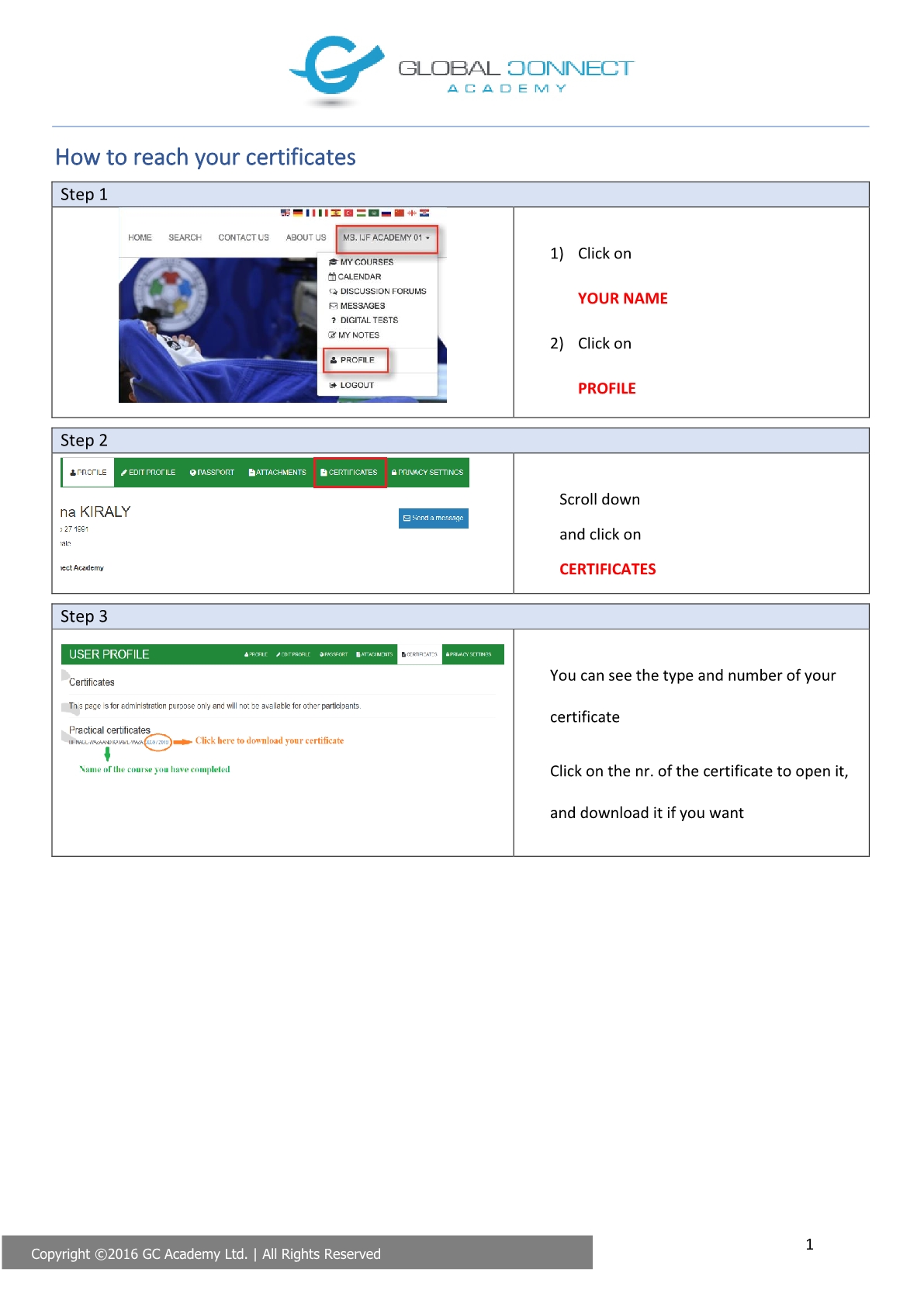
The UDJC course is offered once a year.
The first semester begins in August and lasts until December.
The second semester starts in March and lasts until July.
The IJF Academy Management reserves the right to cancel any semester start indicated above if the minimum number of students exceeds 20.
- The Undergraduate Diploma as Judo Coach (UDJC) programme is a Higher Education Programme accredited by the Malta Further and Higher Education Authority.
- The programme has 60 ECTS credits at Malta Qualification Framework (MQF) Level 5.
- The programme is part-time and aimed at the ages of 18 and 65+.
- Students may require VISA during a practical session organised in Malta; this link provides more information.
The UDJC course is designed to introduce performance coaching for coaches who have performed well at the UCJI Course and have gained enough level of coaching specialisation at the club level. With this specialisation, they can begin to meet their need for high-performance level coaching.
The National Federation Coaches involved in the high-performance competition. This course will give them the structure and methodology to coach judo to high-level athletes. The academic qualification gained also allows our coaches to seek jobs as Judo coaches in National Judo Federations and Judo Clubs all around the World.
Therefore, all Judo Coaches who have completed the Undergraduate Certificate as Judo Instructor (UCJI) course in IJF academy need specific knowledge to train athletes to compete for medals at national and international level and want to enter the profession of coaches are all potential students for this course.
We will also advertise this course as a form of a dual-career opportunity to UCJI graduates who want to enhance their academic qualification while they are still competing, as our blended form of delivery is ideal for their continued travel schedules.
- Minimum 20 years of age.
- Black belt, 2nd Dan in Judo with valid membership of a national judo federation affiliated with IJF.
- Access to the internet by utilising the dedicated online portal to undertake the dedicated module online examination and access a range of indicated online resources.
- Knowledge of the official course languages.
- Necessary fitness level to complete the practical session.
The selection of potential students is the sole responsibility of the National Federations affiliated with IJF.
The nominated students must have a personal email address that will be used to access the education platform during their study period.
No email address of National Federations is accepted; it is highly recommended to set up a GMAIL address for this programme (https://accounts.google.com/signup).
The IJF Academy will send an electronic invitation using the personal email address of the students to sign up. Once signed up, students can sign into the platform with their email address and password and start studying.
If a student cannot complete the semester obligation during two enrolments, the IJF Academy can reissue the full course fee if the third enrolment applies.
Follow the guide above that helps with the sign-up procedure.
Semester 1 (online session) of the programme is delivered through 18 weeks.
Semester 2 (online session) of the programme is delivered through 15 weeks.
Practical Session of the programme is delivered in 1 week. The one-week practical session is organised in collaboration with National Federations and National Olympic Committees in different locations according to the needs.
The programme, in total, takes 34 weeks to complete.
Students must pay the corresponding programme fee (if any) according to the published payment schedule on the programme information page. No refunds are given after payment for admissions unless the candidate is not enrolled in the programme. More details are available in the student agreement that can be reviewed when enrolling in the programme.
Should the student not complete any of the two UDJC semesters online phase after two enrolments, the student must pay a fee of EURO 750 course fee again when the student intends to enrol for the third time and any additional time.
The 60-credit UDJC course is currently available in English only as a pilot program. Once the pilot course is completed, the IJF Academy plans to translate the course into Spanish and French.
This course is primarily aimed at the high-performance coaching requirement of a judo coach who already graduated from the UCJI course of the IJF academy course. In this course, the Black Belt Judoka is introduced to the modules selected as the most critical content that a high-performance Judo Coach should know.
The International Judo Federation aims to enhance the knowledge and skills of high-performance coaches worldwide to provide them with the knowledge that guarantees the sound and healthy development in high-performance in Judo, limiting the cases of injuries and faulty training practice.
Judo Coach
The UDJC course is designed to introduce performance coaching for coaches who have performed well at the UCJI Course and have gained enough level of coaching specialisation at the club level. With this specialisation, they can begin to meet their need for high-performance level coaching.
The UDJC course has two semesters where the syllabus contains core elements common to sectors required for high-performance coaches' qualification.
On completion of a UDJC course that includes the successful completion of the online theory phases (a minimum of 60% passing rate in each theory modules examination) in both, Semester 1 and Semester 2, as well as the one-week practical session (a minimum of 60% passing rate in, Tachi-waza and Ne-waza examinations) the coach will be expected to be able to identify and coach the basic competition model for National, Regional, and International level.
The coach will also be expected to be able to plan and implement a series of appropriate training sessions within the context of an annual training plan.
The UDJC programme has two (2) semesters online phase that includes 20 modules in 33 weeks and one (1) week of the practical session. In total, the UDJC course completion requires 34 weeks.
The learner will be able to:
- identify and describe the development and training of judo techniques for competition
- identify the proper fighting techniques and exercises suitable for the skills and weight group of their athlete
- determine the technical skill level of the group and adapt the training according to their skills
- define the goals of each competition (test event, qualification event, and peak event)
- identify the theoretical components learned into a training plan development
- write the training plan for all Kodokan judo techniques
- write an annual training plan for the athletes to follow
The learner will be able to:
- apply the theoretical components learned into the planning and application of training sessions
- assemble independently additional learning component applicable for the planning of the training sessions
- plan a one-year periodisation plan with two peak points
- prepare specific warm-up, main part, and cool down of a particular judo training session according to the level of the athletes
- lead a competition warm-up session
The students will learn through word documents, PowerPoint presentations converted into PDF files, and videos during the online session and self-study from indicated readings, discussion forum feature and inquiry-based learning.
The PowerPoint presentations are useful in those modules where visual learning is more in focus. The videos represent the correct demonstration of techniques both in the Tachi-waza and Ne-waza and the Katame no Kata.
These videos are recorded in the Kodokan Judo Institute and by the International Judo Federation (IJF) media staff in IJF World Tour competitions. The videos are the primary source of information about the techniques and their accuracy.
The forum discussions are necessary for sharing knowledge among students with different perspectives. The panels of the discussion forums in each module are linked to the IJF Academy course instructor's email address who receives an email when a student conducts a post. As the course instructor has access to the forum, the course instructor can reply by posting. In this case, all the other students can also follow this exchange of information and benefit from it. This inquiry-based learning is to make the students creative in his/her approach to posted issues.
The forum discussion tool in the platform provides the built-in translation tool powered by Google Translate in many languages to enhance and encourage the participating students to post their opinion.
For students who wish to take their learning further, there is also a dedicated section in each module that gives a range of resources that students can access to guide on the knowledge presented within the course. Furthermore, the IJF Academy platform has a unique integrated digital Library section, titled "GC engine Digital Library" function to search for relevant sources and information related to any of the course modules. The GC engine Digital Library function encompasses eight embedded search engines and provides the student with free, full-length findings of the searched topic. The findings can be downloaded, saved, and referred for further citation purposes.
The above is more of a student-centred system with adequate student support for teaching and learning.
The Undergraduate Diploma in Judo Coach course is a blended course. The assessments of the course are the following:
1. The students must complete 18 online multiple-choice test examinations during Semester 1 and Semester 2 of the Online Phase of the course. Each test consists of 20 randomly selected questions, generated using the mathematical algorithm built into the platform. The students have 15 minutes to complete the test and are allowed a maximum of 2 attempts to achieve a minimum pass mark of 60% in each test. If the student has reached 60% by the first attempt, the system will not allow them to complete the second attempt.
All online examinations can only be completed using the platform's face recognition system. Students upload their reference picture when signing up, and the platform, connected to the Azure/Microsoft system, compares the reference picture with the camera picture at the beginning of the test. The test only starts when this detection and recognition is successful. If the detection was not successful, the student could create another reference picture immediately, which would be acceptable due to the use of similar conditions and circumstances at the time of the test.
MONITORING OF STUDENTS’ PROGRESS IS VERY IMPORTANT
- According to the course rules and procedures, the system monitors your participation and performance in the course.
Monitoring 1 of Semester 1:
- The student must achieve a progression rate of 50% at the beginning of Week 10.
- This rate covers the successful Examinations (with a minimum passing rate of 60%) of weeks 1, 3, 4, 6, and 8 (five examinations in total since the beginning of the course).
The monitoring system requires a focused and continuous study, with progress posted on a weekly basis, as outlined in Week 1.
The system will remind ALL students one (1) week before the monitoring deadline.
Please note that IJF Academy management will send NO email reminders.
If a student is unable to pass the monitoring phase in Semester 1, their access to the course will be cancelled, resulting in their withdrawal from the program. Students have the right to submit valid reasons for not reaching Monitoring 1 during Semester 1 to academy@ijf.org. The IJF Academy Management will review the request and respond accordingly, with the option to restore the student's access to the content. This administrative action can be granted once during the two online semesters.
RE-EXAMINATION PERIOD - Semester 1
Students who passed Monitoring 1 in either Semester 1 or 2 but were unable to complete any of the remaining examinations for a valid reason may request to complete these exams in writing. Please send your request to academy@ijf.org before January 15th or July 15th, so the student has enough time to complete the missing exams.
The re-examination period is either January or July.
Should the student be eligible to use the re-examination period, the fee of EURO 150 must be paid to the IJF Academy.
The student will gain access after the invoice has been paid within the re-examination period.
Monitoring 1 of Semester 2:
- The student must achieve a progression rate of 50% at the beginning of Week 9.
- This rate covers the successful Examinations (with a minimum passing rate of 60%) of weeks 2, 4, 5, and 7 (four examinations in total since the beginning of the course).
Therefore, this monitoring system requires a focused and continuous study progress week by week - we have previously sent you the week-by-week schedule
The system will remind ALL students one (1) week before the monitoring deadline.
Please note that IJF Academy management will send NO email reminders.
If a student is unable to pass the monitoring phase in Semester 2, their access to the course will be cancelled, resulting in their withdrawal from the program. Students have the right to submit valid reasons for not reaching Monitoring 1 during Semester 2 to academy@ijf.org. The IJF Academy Management will review the request and respond accordingly, with the option to restore the student's access to the content. This administrative action can be granted once during the two online semesters.
RE-EXAMINATION PERIOD - Semester 2
Students who passed Monitoring 1 in either Semester 1 or 2 but were unable to complete any of the remaining examinations for a valid reason may request to complete these exams in writing. Please send your request to academy@ijf.org. The re-examination period is 30 calendar days from the closing date of the respective online semester.
Should the student be eligible to use the re-examination period, the fee of EURO 150 must be paid to the IJF Academy.
The student will gain access after the invoice has been paid within the re-examination period.
If the student has achieved a pass mark of 60% in all 18 examinations during the online phase (Semesters 1 and 2), this represents 100% progression. Thus, Phase 1 is completed, and the student is eligible to participate in the practical session. No certification is issued at this stage.
2. A one-week practical examination is organised for eligible students as Phase 2 of the course. The following assessments are carried out during the practical session:
a) Demonstration of Katame no Kata
The students must demonstrate the three sets of the 15 techniques of Katame no Kata in the order presented in the online session. Video help is available on the platform to do their rehearsal for the demonstration during the practical session.
The evaluation of the Katame no Kata is Passed or Failed.
If the student failed on the first attempt, the student has a second attempt to carry out on the same day; after all, other students have completed their first attempt.
If the student failed for the second attempt, the student could not be assessed for the further practical elements in (1) Tachi-waza and (2) Ne-waza.
The details of the demonstration are recorded on the Katame no Kata examination sheet. The completed sheets are scanned and stored by the IJF Academy Management for further reference.
b) Practical examination of Tachi-waza
Each student receives the examination template that they must follow and prepare the lesson plans in writing for their four (4) different favorite techniques as follows: one te-waza, one koshi-waza, one ashi-waza and one ma-/yoko-sutemi-waza. One of these four techniques will be their Tachi-waza Examination subjects chosen by the Instructor by random draw.
In the first part, the student must demonstrate the Progression of one of the four Tachi-waza techniques, explaining eight steps with a partner and the four steps with an opponent.
In the second part, the student must demonstrate the Training of one of the four Tachi-waza techniques, explaining six elements classified into three main groups.
The proper demonstration system is explained in the Student Handbook under the title: UDJC / PRACTICAL SESSION ASSESSMENT - TACHI-WAZA
The evaluation of the Tachi-waza examination is a score given by the Instructor in percentage (%). The passing rate of the Tachi-waza test is 60%. If the student reaches 60% or higher by the first attempt, that will be the result in Tachi-waza. In this case, no second attempt is allowed.
If the student failed for the first attempt, the student has the second attempt to carry out the same day; after all, other students have completed their first attempt.
If the student failed for the second attempt, the student could not be assessed for the further practical elements in (1) Ne-waza examination.
The details of the examinations are recorded on the Tachi-waza examination sheet. The completed sheets are scanned and stored by the IJF Academy Management for further reference.
c) Practical examination of Ne-waza.
Each student receives the examination template that they must follow and prepare the lesson plans in writing for their three (3) different favourite techniques as follows: one osaekomi-waza, one shime-waza and one kansetsu-waza. One of these four techniques will be their Ne-waza Examination subjects chosen by the Instructor by random draw.
In the first part, the student must demonstrate the Progression of one of the three Ne-waza techniques, explaining eight steps with a partner and the four steps with an opponent.
In the second part, the student must demonstrate the Training of one of the three Ne-waza techniques, explaining six elements classified into three main groups.
The proper demonstration system is explained in the Student Handbook under the title: UDJC / PRACTICAL SESSION ASSESSMENT - NE-WAZA
The evaluation of the Ne-waza is a score given by the Instructor in percentage (%). The passing rate of the Ne-waza test is 60%. If the student reaches 60% or higher by the first attempt, that will be the result in Ne-waza. In this case, no second attempt is allowed.
If the student failed for the first attempt, the student has the second attempt to carry out the same day; after all, other students have completed their first attempt.
The details of the examinations are recorded on the Ne-waza examination sheet. The completed sheets are scanned and stored by the IJF Academy Management for further reference.
3. Calculation of the final result
The result of the Undergraduate Diploma in Judo Coach is calculated as follows:
- The average result of the 18 online module examinations copleted during Semester 1 and 2 (%) – Result 1.
- The average result of the two practical examinations, explained under the points b) and c), is indicated in percentage (%) – Result 2.
- The average of Result 1 and 2 will form the final result of the Undergraduate Diploma in Judo Coach.
- The students can download the result sheet in PDF format from the platform's profile section.
- The explained result is only validated if the student has also successfully passed the Katame no Kata demonstration that was defined under point a).
Tachi-waza Techniques Progression
- Demonstration of basic technique (kata)
- Demonstration of different grips (kumikata)
- Demonstration of different movements (shintai-dosa)
- Demonstration of different uke’s postures (shisei)
- Combination of the same technique (renzoku-waza)
- Combination of different techniques (renraku-waza)
- Counters against demonstrated technique (kaeshi-waza)
- Transition from tachi-waza into ne-waza (tori-tori and uke-tori)
Tachi-waza Techniques Training
- Warm-up specific for the technique (taiso)
- Solo practice (tandoku-renshu)
- Partner practice (sotai-renshu), forms of uchikomi
- Partner practice (sotai-renshu), forms of nagekomi
- Fighting exercises with low intensity and high intensity
- Physical preparation exercises related to the demonstrated technique
- Stretching exercises related to the demonstrated technique
Tachi-waza Techniques Progression – Example: o-uchi-gari
- Demonstration of o-uchi-gari in form of kuzushi, tsukuri and kake.
- Demonstration of different grips (kumikata). Demonstration of o-uchi-gari changing the position of sleeve hand/pulling hand (hikite) and then changing the position of collar hand/catching hand (tsurite).
- Demonstration of different movements (shintai-dosa). Demonstration of o-uchi-gari when tori moves backwards ayumiashi, and then forwards ayumiashi.
- Demonstration of different uke’s postures (shisei). Demonstration of o-uchi-gari on the same side when uke stays in aiyotsu, kenka-yotsu and jigo-tai positions.
- Combination of the same technique (renzoku-waza). Demonstration of one technique in the same direction, in example o-uchi-gari, uke blocks and tori is doing a second o-uchi-gari. Demonstration of ken-ken-o-uchi-gari.
- Combination of different techniques (renraku-waza). Demonstration of combinations changing directions, starting with o-uchi-gari and throwing with another technique, o-uchi-gari into ko-uchi-gari, o-uchi-gari into tai-otoshi, and then starting with another technique and throwing with o-uchi-gari, such as ko-uchi-gari into o-uchi-gari, o-goshi into o-uchi-gari.
- Counters against demonstrated technique (kaeshi-waza). Demonstration of counter techniques against o-uchi-gari, such as o-uchi-gaeshi, ura-nage, yoko-guruma, tani-otoshi, etc.
- Transition from tachi-waza into ne-waza (tori-tori and uke-tori). In tori-tori transitions tori throws and tori continues in ne-waza: o-uchi-gari into yoko-shiho-gatame, o-uchi-gari into sode-guruma-jime. In uke-tori transitions, uke attacks or throws o-uchi-gari and tori continues in ne-waza with juji-gatame, hiza-gatame, sode-guruma-jime, kesa-gatame, kata-gatame, etc.
Tachi-waza Techniques Training – Example: o-uchi-gari
- Warm-up specific for the technique (taiso). Demonstration of relevant individual, paired or group warm-up exercises relevant for o-uchi-gari.
- Solo practice (tandoku-renshu). Demonstration of practice without partner for o-uchi-gari, ken-ken-o-uchi-gari, o-uchi-gari into ko-uchi-gari, o-uchi gari into tai-otoshi, ko-uchi-gari into o-uchi-gari, o-goshi into o-uchi-gari, etc.
- Partner practice (sotai-renshu), forms of uchikomi. Repetitive exercises in low intensity for breaking balance (kuzushi), breaking balance and positioning (kuzushi and tsukuri), breaking balance, positioning and lifting when possible, in example for o-uchi-gari. Repetitive exercise in high intensity for o-uchi-gari. Repetitive exercise for strength with two uke.
- Partner practice (sotai-renshu), forms of nagekomi. Repetitive throwing exercise in low intensity, on crash mat if possible for o-uchi-gari. Repetitive throwing exercise in high intensity for o-uchi-gari.
- Fighting exercises with low intensity and high intensity. In low intensity fighting exercise, both judoka trying to throw o-uchi-gari. In high intensity fighting exercise, tori try to throw o-uchi-gari, and uke avoid using different tasks, such as just moving, just ashi-waza, just using one side grip, just blocking, just pushing out, just countering, etc.
- Physical preparation exercises related to the demonstrated technique. Demonstration of relevant strength and conditioning exercises, in example for o-uchi-gari, individual or with partner, in dojo or in the gym, using different materials.
- Stretching exercises related to the demonstrated technique. Demonstration of relevant stretching exercises, in example for o-uchi-gari.
Note: For Tachi-waza Examination each student should prepare the lesson plans for four (4) different techniques as follow: one te-waza, one koshi-waza, one ashi-waza and one ma-/yoko-sutemi-waza. By randomly draw, one of this four subjects will be the Tachi-waza Examination.
Ne-waza Techniques Progression
- Demonstration of basic technique
- Demonstration of escapes
- Demonstration of variants
- Demonstration of escapes related to variants
- Entering from ne-waza standard situations
- Ne-waza combinations
- Countering uke’s ne-waza initiatives
- Transition from tachi-waza into ne-waza (tori-tori and uke-tori)
Ne-waza Techniques Training
- Warm-up specific for the technique (taiso)
- Solo practice (tandoku-renshu)
- Partner practice (sotai-renshu), forms of uchikomi
- Fighting exercises
- Physical preparation exercises related to the demonstrated technique
- Stretching exercises related to the demonstrated technique
Ne-waza Techniques Progression – Example: kesa-gatame
- Demonstration of kesa-gatame
- Demonstration of escapes from kesa-gatame, such as gripping the leg, turning to opponent, pulling the opponent to the other side.
- Demonstration of variants. Demonstration of kuzure-kesa-gatame and ushiro-kesa-gatame.
- Demonstration of escapes related to kuzure-kesa-gatame. Demonstration of escapes related to ushiro-kesa-gatame.
- Entering kesa-gatame, kuzure-kesa-gatame and ushiro-kesa-gatame from ne-waza standard situations, such as tori between the legs of uke, uke between the legs of tori, uke in bank position, tori in the bank position, uke on the back and tori over uke with one leg between uke’s legs.
- Ne-waza combinations. Starting with kesa-gatame, kuzure-kesa-gatame, ushiro-kesa-gatame and finishing with other techniques. Starting with other techniques and finishing with kesa-gatame, kuzure-kesa-gatame and ushiro-kesa-gatame.
- Countering uke’s ne-waza initiatives. Uke is attacking with tsukomi-jime, sode-guruma-jime, kuzure-kesa-gatame, etc. and tori is tacking over the initiative finishing with kesa-gatame, kuzure-kesa-gatame and ushiro-kesa-gatame.
- Transition from tachi-waza into ne-waza (tori-tori and uke-tori). Tori is throwing and tori continues with kesa-gatame, kuzure-kesa-gatame and ushiro-kesa-gatame. Uke is attacking in tachi-waza or throwing and tori continues with kesa-gatame, kuzure-kesa-gatame and ushiro-kesa-gatame.
Ne-waza Techniques Training – Example: o-uchi-gari
- Warm-up specific for the technique (taiso). Demonstration of relevant individual, paired or group warm-up and coordination exercises, relevant for kesa-gatame, kuzure-kesa-gatame and ushiro-kesa-gatame.
- Solo practice (tandoku-renshu). Demonstration of practice without partner for kesa-gatame, kuzure-kesa-gatame and ushiro-kesa-gatame.
- Partner practice (sotai-renshu), forms of uchikomi. Repetitive exercises in low intensity, in example for kesa-gatame, kuzure-kesa-gatame and ushiro-kesa-gatame.
- Fighting exercises with high intensity, in example for kesa-gatame, kuzure-kesa-gatame and ushiro-kesa-gatame. Each judoka will act as tori and uke, using standard contest situations such as uke defending face down, face up, but also pinning, strangling and arm looking situations, depending on demonstrate techniques.
- Physical preparation exercises related to the demonstrated technique. Demonstration of relevant strength and conditioning exercises, in example for kesa-gatame, kuzure-kesa-gatame and ushiro-kesa-gatame, individual or with partner, in dojo or in the gym, using different materials.
- Stretching exercises related to the demonstrated technique. Demonstration of relevant stretching exercises, in example for kesa-gatame, kuzure-kesa-gatame and ushiro-kesa-gatame.
Note: For Ne-waza Examination each student should prepare the lesson plans for three (3) different techniques as follow: one osaekomi-waza, one shime-waza and one kansetsu-waza. By randomly draw, one of this three subjects will be the Ne-waza Examination.
Regular participation and performance of students in the course is monitored by the system. The student must achieve the appropriate progression rate by week 9 (50%).
This requires a focused and continuous study progress week by week.
The progression rate will be checked by the system on the first day of Weeks 9 to provide the student the time to complete the Examination.
The progress will be based on the successful completion of the following components:
1. Examination results for a minimum 60% success rate in each scheduled module.
Should the student not be able to comply with the progress of these components, the student's access will be disabled, and the student cannot continue the course.
The UDJC certificates are delivered directly to the students only by email in PDF format. The certificates are only delivered if the student has completed all the necessary requirements. In the case of the UDJC programme:
- During Semesters 1 and 2, pass 18 weekly exams with a minimum of 60% in 1+1 attempts.
- Successful demonstration of Katame No Kata during the Practical Session.
- Successful completion of Tachi-Waza and Ne-Waza practical examinations during the practical week. Pass mark: 60%.
Each National Federation is responsible for its competitors (the control of non-pregnancy, as well as the control of gender) and must take all responsibility for the accident and health insurance as well as the civil liabilities for their competitors and officials during the Practical Session described in these outlines.
The organiser of the event and the IJF will not be responsible for any insurance related to the above-mentioned matters. Nevertheless, the National Judo Federation staging the Practical Session shall take all necessary actions to provide insurance coverage against civil liability for the entire duration.
The organiser of the Practical Session and the IJF have no liability for any claims of injury, illness or death arising from the participation and travelling in connection with this event.
